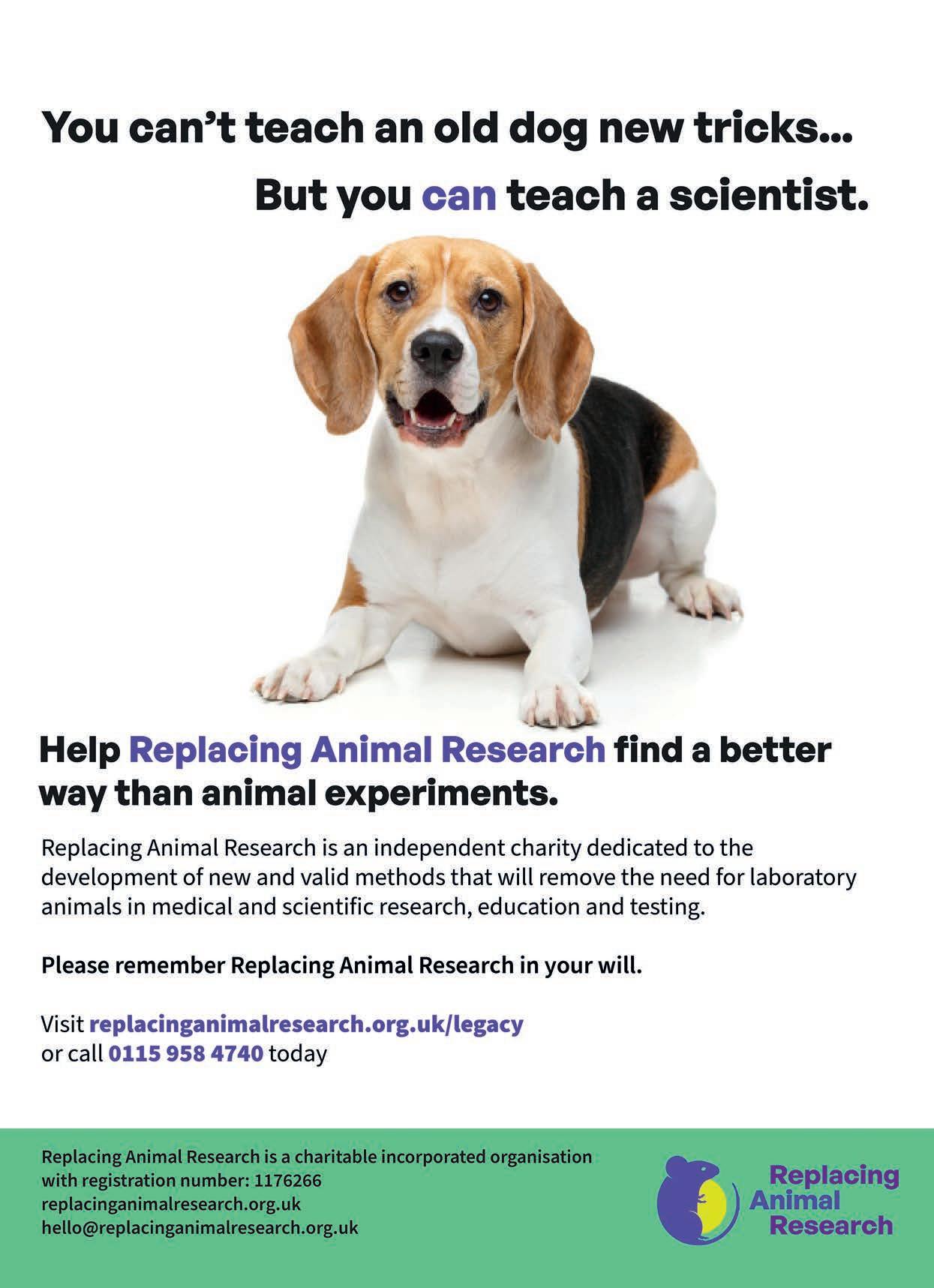


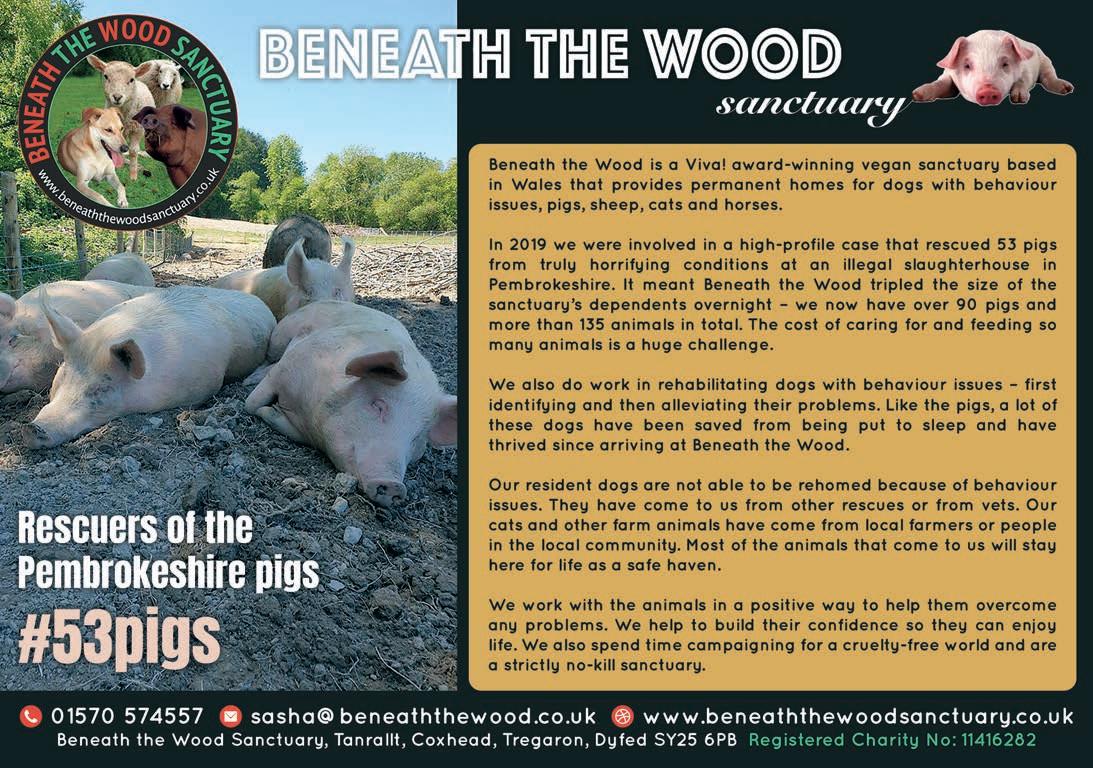





The much-awaited event of the autumn was the first Budget of the new Labour government. It was awaited with trepidation by the legacy sector, which feared a change to exemptions from Inheritance Tax for charitable bequests. It didn’t happen, so the sector heaved a sigh of relief.
• Another reason for relief for legacy professionals came with the figures for probate grants, which are catching up following the catastrophic backlog of recent years. For many charities, however, the relief comes only after swingeing cuts have had to be made.
• It’s possibly the result of all the uncertainty, but the legacy sector is suffering a crisis of recruitment and retention. However, for the many legacy professionals who are happy with their careers the rewards are manifold, culminating in the recognition by their peers of their achievements with one of the prestigious awards presented in the autumn.
• Legacy professionals were not the only ones to have looked to the Budget with bated breath. The wider charity sector drew pluses and minuses from the announcements – the biggest minus, ironically, being the rise in National Insurance contributions. Added to the many setbacks




created by the cost-of-living crisis, the result could be redundancies among charities across the country.
• Despite the tribulations suffered by charities, trustees couldn’t be more enthusiastic about their role. In fact, eight out of 10 charity trustees would recommend the role to others. Research from the Charity Commission and Pro Bono Economics has revealed a widespread feeling that acting as a trustee brings benefits as well as responsibility. The feeling was reinforced by no less a figure than Reeta Chakrabarti.
• A thankfully rare example of charity trustees acting in a less than exemplary fashion has been revealed by the commission’s inquiry into the Captain Tom Foundation. Perhaps not unexpectedly, given what was already in the public domain, the inquiry found the couple running the charity guilty of misconduct and/or mismanagement.
• Putting all the vicissitudes besetting charities to one side, at the time of writing the festive season is in full swing. For charities, Christmas is indeed the time of goodwill, with donations reaching a high during December. Hopefully, charity workers and their hard-working advocates can join in the festivities. Accordingly, we wish all our readers a charitable Christmas and a tranquil New Year.

www.magprint.co.uk


The photograph on the right of border collie Nipper was taken on the same day that he’d been taken to a vet’s to be put to sleep. Purchased as a ‘surprise’ gift, he was unwanted. This beautiful puppy was just eight weeks old and is just one of almost 10,000 animals rescued by Friends of the Animals.
There was a happy ending as –now renamed Stanley – he was rehomed with one of the charity’s voluntary drivers, who adores him.

Friends of the Animals began in March 1990 and had very humble beginnings. Veterinary treatment is invariably the charity’s biggest outgoing and to date they have spayed or neutered 45,000 animals. Thousands more have been wormed and inoculated – often for the first time in their lives!

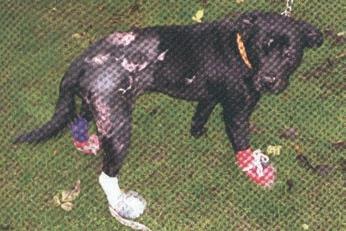
Founder Helen Sinclair MBE, who was honoured for Services to Animal Welfare in 2014, takes up the story: “There have been many memorable cases, where we’ve saved animals’ lives against all the odds. Animals such as the puppy who slipped under the railings of a balcony – luckily bouncing off the conservatory roof which broke her fall. Then there was the dog who fell down a manhole in the road after someone had removed the cover, and poor Marshall, who had three broken legs and a severed ear.
“Susie, a Labrador/Staffy cross (pictured above), was badly burnt in a house fire, but made a good recovery; and the dear little cat above had everything wrong with him, but survived and thrived.
“When 11 month old Border Collie ‘J.J.’ came into our care, she had a pin / plate poking through
a badly infected front leg, a paw so badly crushed the bones had fused together and a stab wound.
“Her original owner pleaded guilty to causing unnecessary suffering to a protected animal and was fined £2,000 and banned from keeping an animal for ten years.
“As you can see from the wonderful photo below, ‘J.J.’ went on to much better things.”

Gifts in wills fund one in two veterinary treatments and so legacies are an absolute lifeline to the rescue and spaying/neutering work carried out by Friends of the Animals.
The charity has a policy of non-destruction, unless an animal is sick or injured with no hope of recovery, and they keep admin costs to a minimum. Very importantly, 90% of their staff are volunteers, which ensures as much of your gift as possible is spent on saving animals.
Pitted against that constant battle to save lives was the action of the person who set fire to the front of the Charity’s base.
“But, happily,” said Helen, “we're a resilient team and together with the help of supporters, we barely skipped a beat and just kept on going.

“We truly appreciate that people have many choices regarding charities to support, but no one appreciates it more, or tries harder than we do, to get the very best possible use from every penny donated. Thank you for your consideration.”


[ LEGACY FUTURES has released the latest findings of its Legacy Market Review , the sector’s annual benchmarking research programme which gathers data from over 80 charities accounting for almost 50% of the charity legacy market. The average legacy value stands at £28.9k, slightly above its 2021/2022 peak of £28.5k. However, a lower than expected death rate resulted in reduced bequest numbers.
Legacy income continues to show resilience and serves as a crucial source of funding for UK charities, even amid slower growth in recent years.
In its Legacy Market Review , Legacy Foresight – the research arm of Legacy Futures – said: “Once again, legacy income has remained a resilient source of funds to charities, although growth has not been as high as seen in previous years. In 2023/24, legacy income was £4.1bn, just a 1.3% increase on the previous year but still remaining above the £4bn level.
“This is lower growth than we have seen over the long-term history of legacy income, but in the backdrop of a challenging external environment this is still a huge boost to charities.”
The average growth in value of legacies has been slow because of sluggish growth in the housing market. The report says: “UK market average values have seen limited growth in the last two years, since they peaked at £28.5k in 2021/22. Since then, average values have grown only slightly to £28.9k in the most recent year, growth of just 0.4% pa, compared to a long-term average growth of 3.1% pa.
“However, things have not been as bad as originally feared. This time last year, house prices were expected to decline in 2023/24 and 2024/25, and not recover to 2022/23 levels until 2027. The latest forecast from Oxford Economics suggests 2024/25 will now see growth, albeit relatively small. This growth continues and accelerates over the following four years, meaning a much more positive picture for legacy values.”

Ashley Rowthorn, CEO of Legacy Futures, suggests charities should be focusing now on their planning to be future-ready: "The
long-term outlook for legacy income is brighter than it has ever been, yet short-term challenges persist,” he said. “While legacy income remains stable, inflation is impacting charities' purchasing power, tightening budgets and cash flow. Charities must stay informed of the external drivers of legacy income to understand market influences on their performance and to plan effectively.

“The time is now; investing in legacy fundraising today will allow charities the time to build and secure a lasting income stream into the future as the market develops and grows – a strategy that will help them navigate economic uncertainties and sustain impact for decades."
Lucinda Frostick, director of charity umbrella Remember A Charity, commented: "Legacies are an increasingly vital income stream for a growing number of charities, strengthening resilience and sustaining charitable work through challenging economic times. This is a reflection of the dedicated focus given to legacies over the years, both within charities individually and in working collectively. As we look to the future and consider the anticipated growth of the legacy market, it shows how crucial legacy fundraising will be to ensure a thriving charity sector and charitable services for years to come.” q


[ AT THE Isle of Wight Donkey Sanctuary, we provide a caring haven for donkeys, mules and ponies in need, whether from maltreatment, loss of grazing, rescue from slaughter, or simply when their owners can no longer care for them. We welcome these beautiful, inquisitive animals, caring for them with love and kindness throughout their lives.
Leaving a gift in your will is a heartfelt way to show your love and support for our donkeys, ponies and mules. Legacies from compassionate supporters enable us to continue providing the highest levels of care and welfare for every animal in our care.
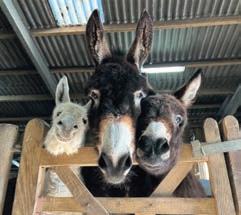
The bonds between donkeys and humans are truly unique. Simply being in their presence can bring joy and comfort. We support many people to develop skills, build confidence, or simply to help them experience a loving connection with our animals. Your gift in a will can help ensure a happy and healthy life for the animals under our care, leaving a legacy of love, not only for our donkeys but for the many lives they touch.
Our mission is to provide refuge, exceptional care and new beginnings for donkeys and other equines in need. Can you support us by leaving a gift in your will? q

For over 140 years gifts in Wills have provided vital funding to Edinburgh Dog and Cat Home, helping to keep its doors open.
It costs almost £3m a year to run the Home, and in the absence of any regular government funding, donations and fundraising initiatives are essential to keep helping dogs, cats and the people who love them.
One of the most powerful ways that the community has supported the charity is by leaving gifts in their Wills. An astounding one in three animals cared for at the Home each year has had their care funded by legacies.
Head of Fundraising, Gillian MacAulay explained: “We simply couldn’t keep going without this lifeline and there really are no words to describe what it means to us when we discover that someone has made that decision to include us in their Will.
“This support can transform the lives of the hundreds of vulnerable animals who need our help each year – for as long as they need it. By leaving a gift, your love and compassion for animals can live on.”
To find out how to make a lasting contribution, please contact Aiste Klisyte, Legacy Officer at Aiste@edch.org.uk or visit edch.org.uk/support-us/gifts-in-wills.
[CHANCELLOR OF THE EXCHEQUER Rachel Reeves’s Autumn Budget statement was welcomed by both the Institute of Legacy Management (ILM) and Remember A Charity for the government’s decision to keep inheritance tax (IHT) incentives in place for individuals who choose to leave a legacy gift to charity.
Alex McDowell, vice-chair of Remember A Charity, commented: “Fiscal incentives play an important role in inspiring more people to leave a legacy gift and encouraging professional advisers to make their clients aware of the option and benefits of including a charity in their will.
“Legacy gifts are not only a deeply meaningful way of giving, but they are also vital to society, helping to fund everything from hospice care to emergency services, homeless charities to community care, supporting people who are alone and vulnerable.
Alex continued: “A smooth-running probate service can reduce the stress experienced by bereaved families. It can also ensure gifts kindly included in charity supporters’ wills can be put to good use sooner, enabling charities to plan and deliver their essential services.”
Remember A Charity had called on government to protect the fiscal incentives that encourage legacy donations and had earlier this year presented evidence to the Parliamentary Inquiry pertaining to the importance of a well-run and well-funded probate service.

"The government’s preservation of these crucial incentives is instrumental in helping to safeguard the long-term sustainability of charitable causes in the UK. These incentives could become even more impactful should more estates qualify for IHT as a result of the IHT thresholds being frozen.”
Remember A Charity also hopes that the 2% productivity and efficiency savings target set for all government departments next year will mean that further improvements will be seen in the probate service. In recent months the situation has seen a marked improvement –something the charity umbrella would like to see continue.

“We promise our member charities that we will continue to work with the government and policymakers to influence and shape the future legacy giving landscape for the benefit of charities, supporters and bereaved families alike,” the organisation pledged.
Matthew Lagden, CEO of the Institute of Legacy Management, has also welcomed the Chancellor’s decision to keep IHT relief for charitable gifts in wills and to maintain the exemption from capital gains tax on the sale of property or assets donated to charity.
He said: “Charities rely heavily on legacy giving and there will be a unanimous sigh of relief within the charity community that the Chancellor has seen fit not to make any changes to this incredibly important pipeline of financial support.”
The ILM reproduced a guide from HMRC to the Inheritance Tax measures that were announced in the Budget. It can be read at legacymanagement.org.uk/autumn-budget. q
[ESTABLISHED IN 2001, the Suffolk Owl Sanctuary – known, appropriately, as S.O.S. – operates a comprehensive facility for the rescue, care and rehabilitation of owls across East Anglia. It also promotes the need for the conservation of endangered owl species throughout the UK with its Saving Britain's Owls initiative.
The S.O.S. owl and raptor hospital at Stonham Aspal is unique in the region. It is specially equipped for the care and treatment of the many injured wild owls and other birds of prey it receives every year as a result of road traffic accidents, mishaps, starvation, trauma, disease, poisoning and sometimes even shooting or trapping.

Many of the birds can be given a recuperative, short-term pick-me-up before being re-released into the wild. Those that are more seriously injured but stand a chance of recovery are given medical aid and/or surgery, as determined by their vet. The birds are then allowed space and time to fully recuperate in one of the secluded recovery aviaries, before being carefully returned to the wild.
S.O.S. operates a wild owl nest box scheme that includes building, locating, curating, and repairing environmentally friendly nest boxes in appropriate locations to replace the gradual erosion of natural nesting sites.
S.O.S. is funded purely by donations and as a small charity, the legacies it receives play an important role in enabling it to sustain the resources needed to actively promote the conservation of owls and other birds of prey throughout the UK. q


[LEGACY RESEARCH ORGANISATION Legacy Futures has published a report addressing the recruitment and retention issues facing the charity legacy sector. Legacy Futures worked in association with Remember A Charity to consult senior legacy fundraisers on how the key challenges are impacting their organisations and themselves as legacy professionals.
The findings have been published in Building Better Futures in Legacy Fundraising 2024, which contains data from 52 respondents and input from industry focus groups to ‘explore the results and practical solutions that could support legacy fundraising and translate to the broader fundraising sector’.
Matthew Lagden, CEO of the Institute of Legacy Management, commented: “This report provides excellent insight into the reasons why the legacy sector may have a recruitment problem and makes some extremely worthwhile suggestions about how charities can do more to attract and retain key legacy personnel.
“I would urge any charity to consider these findings and be prepared to think ‘outside the box’ when it comes to engaging with both the retention of current and the recruitment of new legacy team members.”
The report shares strategic recommendations and practical advice that charities could take to improve their recruitment processes, to better source relevant and transferable skills and to retain valuable talent and experience. It was compiled by the Legacy Leaders Forum, a special interest group facilitated by Legacy Futures comprising senior legacy fundraisers from 19 UK charities, including Alzheimer's Society, Parkinson’s UK and British Red Cross.
Ashley Rowthorn, CEO of Legacy Futures, commented: “The recruitment and retention challenges facing the legacy sector, and indeed the third sector as a whole, have been at crisis point for some time now. It is our intention with this report to provide leaders of organisations with real, in-depth insight into the extent and root of these issues. Providing sector-led advice, both on a strategic and practical level, along with the data, means that charities aren’t just faced with the facts; they’re also equipped with suggestions of how to address them.”
The strategic recommendations contained in the report include the need to create a clear pathway that allows legacy fundraisers to become leaders. It also reminds the sector of the critical importance of legacies and their impact on the future sustainability of organisations.
Key findings include:
• 77% of respondents reported a shortage of quality candidates
• responding to job ads
• Three quarters said that finding candidates with the right skill set for
• the role is a challenge
• 61% of legacy fundraising professionals are leaving their roles due
• to salary dissatisfaction
• Two thirds have been tempted away by a role in a different charity
• More than half (53%) reported moving to another organisation
• because their current charity did not offer them career progression
To address the challenges:
• Almost three quarters (73%) have allowed more flexibility
• 60% have hired from other areas within the organisation
• Almost half (48%) have hired from outside the charity sector, with
• the teaching profession being cited as one such industry that
• organisations have turned to.
Ceri Edwards, executive director of change at the Chartered Institute of Fundraising, said: “This study spotlights staffing issues in legacy fundraising that reflect the challenges faced by the entire fundraising profession around recruitment and retention of skills and experience. The strategic recommendations and practical advice from the senior legacy professionals who have collaborated here will have immense value for legacy teams and will help inform the wider sector’s work in this area.”
Lucinda Frostick, director of Remember A Charity, concluded: “Legacies can be hard to predict, but history shows us charities that invest in legacies and their legacy teams are most likely to see growth in their market share. Our people: their knowledge, creativity and passion for the cause are surely our biggest assets, alongside our supporters. And as more charities move into the legacy sphere, it becomes even more important that we grow and nurture talent.”
The full report is available to download at www.legacyfutures.com/ latest/building-better-futures-in-legacy-fundraising q

[ JOANNA LUMLEY, Patron of The Respite Association (TRA), recently paid this tribute to carers: “Carers are my heroes: caring 24/7, week-in and week-out, often for years on end, with no breaks or holidays and no complaints.”
Across the country there are thousands of unpaid carers; and since its formation in 2001 TRA has been supporting them to get a desperately needed break.
John Turner, one of the charity’s two part-time staff, explained: “It doesn’t take a great deal to have an enormous impact on the lives of carers. They don’t see what they are doing as a burden because they are caring for someone that they love; but they just need a little rest.”
“One lady, whose son is on the autistic spectrum, explained that he only sleeps for two hours per night, so that is all the sleep she gets, too. That lady just wanted a normal night’s sleep to catch up – while a gentleman in his seventies, caring for his wife who has dementia, wanted a weekend so he could go to his granddaughter’s first piano recital.”
TRA also have three holiday facilities - in Cornwall, Wales and Yorkshire - where they give carers a week-long break by the seaside. A carer who had a break in the charity’s caravan at Rhyl


wrote: “We had the most amazing time on holiday – gutted to be home in fact. Whilst I was there I couldn't help thinking of you and what an amazing opportunity you gave us. Me and my family are extremely grateful and always will be.
“The caravan was filled with lots of board games and books for both adults and children and we loved it. I usually don’t have time to read with my children or sit and do a jigsaw with them, but on holiday I did – everyday. And instead of dishing out medication of an evening I spent that time in the park with my family.
“It was so good to just be out in the fresh air and actually taking in the sky! You allowed me to have uninterrupted quality time with my children and for that I’m truly thankful.”
John explained “TRA offers something that you and I take for granted: a little bit of normality; enough to recharge the batteries and carry on caring. We have been incredibly fortunate that people have been very generous to us over the years, which has helped us to support thousands of carers and their families, and has provided a legacy of hope.” q
[
PROMOTING AND ASSISTING in access to justice in the Family Court is the aim of Parenting Together, a charity set up by former youth worker Gerry Hannah.
Gerry points out suicide is the most common cause of death among young people – often prompted by the depression caused by family break-up. He believes that in many cases the break-up of the family is avoidable if parents are able to present their version of events.
Said Gerry: “British Family Courts sit in private and they convict parents merely on the ‘balance of probability’. In some cases a judge is persuaded to make a misinformed decision based on race, gender, heritage, beliefs and social status – often causing serious depression which can have lethal consequences.”
Gerry formed his association with humanitarian experts and professionals to ensure low-income, disadvantaged parents involved with social services or Family Court proceedings receive fair and equal justice.

He added: “We mostly provide specialist legal services, advocacy and reports for disadvantaged parents in Family Court proceedings. Our experts, professionals and associate solicitors often work pro bono to help us resolve exploitation and unlawful abuse of the family
law and child protection systems. We framed our projects on the government’s Every Child Matters report, published in 2003, that recommended engaging families in the care and protection of children.”
He points to cases of parents with learning difficulties asking people on social media for advice when they cannot understand the legalese, acronyms and procedures.
“They are usually misguided, posting views and comments that go against them in court. Their social media ‘friends’ are often predators who exploit single parents with young children. We recently submitted evidence to the CPS against a few of these sexual predators targeting our vulnerable parents and their children.”
The current project is a continuation of Honeypot Families, a work-in-progress study comparing families in the safest happiest regions of the UK with families in what Gerry describes as ‘the most dangerous city in Europe’.
“We concluded that Judeo-Christian families functioned efficiently to provide the best outcomes for everyone because they are based on a mutually agreed contract where adults vow to love, care and respect each other until death.” q

[ NEW GUIDANCE has been issued by the Competition and Markets Authority (CMA) following its investigation into unregulated providers of will-writing, online divorce and pre-paid probate services.
While the will-writing guidance is aimed at unregulated providers and the public, it can also be particularly helpful for charities that signpost supporters to relevant willwriting providers or partners.

Lucinda Frostick, director of charitable legacy umbrella group Remember A Charity, commented: “This new guidance is an important development for legacy fundraising, helping charities and donors alike understand the range of options for will-writing, and the key questions to ask to help choose the right service for them.”
The will-writing market has expanded rapidly in recent years, with a growing range of services now available to the public. The new guidance aims to:
• Help the public make more informed choices
• Support unregulated practitioners in complying with their obligations
• Increase protection for consumers who opt for alternatives to high
• street solicitors when making a will.
The CMA emphasises that consumer protection applies for anyone writing a will, even if those services are funded through a charity.
Remember A Charity said: “We're encouraged to see that recommendations we made at consultation stage, working jointly with the Institute of Legacy Management, have been taken forward by the regulator, and that the consumer guide links to Remember A Charity’s Making A Will pages, growing awareness of legacy giving within the will-writing journey.”
There are two sets of guidance: for providers and for the public. In its guidance for providers, the CMA summarises the do’s and don’ts. That includes the importance of unregulated providers ensuring that

[FAILING EYESIGHT is nothing short of a personal catastrophe. Do you have a family member, friend or neighbour who is gradually losing their sight?
Reading, recognising friends and living skills are all affected as your sight is going – and it’s much harder if you live alone.
The National Federation of the Blind of the UK (NFBUK) keeps its members in touch with general information, help and updates on what’s going on.
The charity produces bi-monthly news magazines and circulars in audio, braille or electronically, which members can read independently. It also encourages blind and partially sighted people to play a fuller part in society. q
• For further information contact NFBUK on 01924 291313, email admin@nfbuk.org or visit www.nfbuk.org
terms and conditions are clear, fair and accessible.
It also advises those providers to avoid any misleading comparison of services and to make it clear how involved solicitors and other regulated legal professionals are in the process. It includes some useful case studies showing what practices would be considered compliant.
The guidance for providers can be viewed at www.gov.uk
The complementary consumer guide is available for people making a will. It explains what services are available, how they differ and the public’s rights if anything goes wrong.
It includes a list of useful questions, such as establishing the qualifications, training or experience of the practitioner, asking about professional indemnity insurance and their complaints handling process.
The consumer guide also advises checking whether the provider is drafting the will, using a third party or legal adviser to draft the will, or if the service is based on a template or online form – ensuring people understand the service they are purchasing. The same questions can be useful for charities when considering potential partnerships with willwriting providers.
A short guide for consumers is available at www.gov.uk
Remember A Charity’s own Making A Will pages can be viewed at www.rememberacharity.org.uk/making-a-will q



[THE SUFFOLK PUNCH TRUST is a registered charity, whose aim is to ensure the survival of the famous horse breed. It was founded in 2002 to save the historic Hollesley Bay Colony Stud.
That stud brought a rich legacy of equine and agricultural history which deserves to be saved for future generations to enjoy. The trust aims to achieve that through a successful breeding programme, supported by funding, education and the outreach facility of its visitor centre.
The Suffolk Punch is the oldest English breed of working horse, dating from the 16th century. Every Suffolk horse can be traced back to a stallion, known as Crisp’s Horse of Ufford, foaled in 1768. The Suffolk horse was developed for farm work and gained popularity during the early 20th century. As agriculture became mechanised, however, the numbers fell and the breed almost disappeared completely.
The aim of the trust is to help save the iconic breed from extinction through its established breeding programme. It is working towards increasing the numbers of horses through normal breeding processes and an artificial insemination programme.
It also works to raise public awareness and is training a new generation of professionals to work with and understand the needs of the breed. The Suffolk Punch is incredibly versatile and is now often employed in forestry and ridden work.
The Suffolk Punch Trust can only continue its work with the help of donations and legacies. As David Clarke, one of the trust’s directors, explained: “Your legacy, large or small, will make a huge difference to the work we carry out, enabling us to care for our horses and continue the breeding programme to secure this wonderful breed.” q
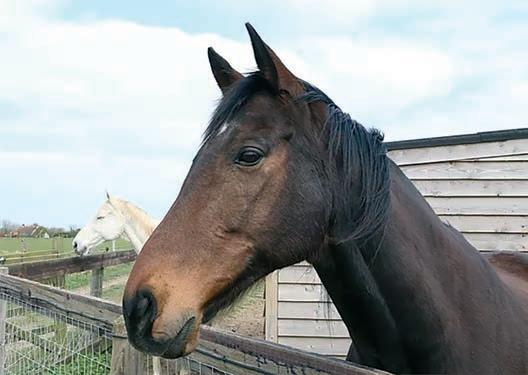
[
now live in a new home at Sink Farm
and are cared for alongside the wonderful
Sink Farm is the colony stud for the Suffolk Punch Trust charity, who continue their important and essential work in preserving this unique breed. q
• For more information on either charity please contact Tracey Pettitt, stud manager or David Clarke, finance director, on 07768 025128. Heartbeat Homes for Horses, Sink Farm, St David’s Lane, Hollesley, Woodbridge, Suffolk IP12 3JR
[NEXT YEAR’S Excellence in Legacy Administration (ELA) conference will be held online on 11 February 2025. Now in its 7th year, the event brings together leading professionals to share expertise and insights on the latest challenges in legacy administration.
With rising pressure on legacy teams to secure income and stay on top of cases, administration professionals must keep informed on the changes to charity law, developments in government policy, probate notification timelines and industry best practice.
In addition to offering the very latest sector updates, the conference – organised by Smee & Ford – provides a unique opportunity in which to hear directly from charity peers – who offer their experience and practical insights into the challenges of working in legacy administration – as well as the very latest analysis into legacy income trends.
Combining panel sessions, data analysis and case studies, the day provides both inspiration and first-hand solutions on strategy and best practice, as well as highlighting the challenges for the coming year.

[ TICKETS ARE NOW ON SALE for the ILM Annual Conference, which returns on 9 May next year. Promising to be bigger and better than ever before, the conference has been upgraded to a new, larger location at 133 Houndsditch, London – very close to the previous venue and still in easy reach of main transport links.
After an intensive selection process supported by both members and board directors, a fabulous and varied programme of speakers and topics has now been chosen. In addition to networking opportunities throughout the day and at the drinks session afterwards, there will be a selection of stands to browse during breaks.
ILM CEO Matthew Lagden commented: “We’re absolutely thrilled to be ringing the changes for 2025. We know how much members value our amazing line-up of speakers every year and we firmly believe the conference line-up will appeal to a broad cross-section of charities of all shapes and sizes.
“Moving to a larger venue means more members will be able to attend and we very much hope they will find the day to be interesting, informative and, above all, inspiring.”
As per tradition, the team from Legacy Foresight will deliver its annual ‘state of the nation’ update and the winners of the ILM and Legacy Futures Awards will be announced. The ILM Awards are the Legacy Professional of the Year and the ILM Mentor of the Year, while the Legacy Futures Awards are The Crispin Ellison Bursary – furthering professional development in legacy administration – and The Future Leader Bursary: a mentoring pathway for those new to legacy or in-memory roles, awarded in partnership with the Elischer Foundation. q
Current Legacy Data Trends: An overview of the latest legacy data insights, featuring perspectives from Smee & Ford and Legacy Futures.
Elevating Legacy Teams Within Charities: Gaining internal recognition and boosting team morale, even in challenging financial times.
Emotional Intelligence in Legacy Management: Exploring the critical role of emotional intelligence in the legacy administrator’s skill set.
Developing Future Legacy Professionals: Addressing the legacy recruitment challenge with innovative training and apprenticeship programmes.
Grief Awareness in Legacy Support: Strategies for compassionate communication with bereaved lay executors, enhancing empathy and understanding.
To book your place visit excellenceinlegacyadmin.co.uk q
[ THE Smee & Ford Legacy Giving Awards 2025 will be taking place on 24 April at The Hilton London Bankside. The UK's only awards recognising individuals and teams across the whole legacy giving sector showcase the outstanding achievements, talent and dedication of UK legacy giving professionals, and highlight the vital and significant income that gifts in wills bring to charities.
Now in their 3rd year, the unique awards aim to inspire charities and their partners to think bigger and aim higher, and to raise the profile of the valuable work of professionals within their own charities, while also providing a platform to benchmark the progress made through collaboration and innovation across the sector.
Combining a morning Excellence Forum with an afternoon award ceremony, the day promotes talent, partnerships and creativity in legacy giving, provides insight and inspiration from the award-winning entries, encourages lively discussion on the direction of the sector, and brings together this brilliant community to share their pride in working in this incredible sector.
Winning a Smee & Ford Legacy Giving Award is a prestigious achievement for individuals, teams, projects and partnerships that recognises excellence, innovation and impact. It helps with:
• Improving profile: Winners can position themselves and
• their organisation as leaders in legacy giving; they can help
• inform the sector by sharing their contributions and insights
• and enhance their organisation’s reputation and ability to
• attract the best talent.
• Securing senior buy-in by highlighting the excellence, agility
• and success of winners’ legacy giving strategy with senior
• leaders and peers.
• Boosting team morale: The awards bring together teams
• and individuals to celebrate exemplary skills and give
• people a boost to help them go back to demanding
• workloads with a renewed sense of purpose and positivity. The judges are picked according to their expertise, meaning entrants benefit from useful feedback on entries from a diverse panel of sector specialists. q


[CARING FOR UNCLAIMED stray dogs can be challenging and the rising numbers are having an impact on Hope Rescue’s already stretched resources. Most of these dogs have been deliberately abandoned and Hope has committed to never leaving a dog behind regardless of age, breed, health or behaviour. This means that many of the dogs that come to Hope need additional care, be that through veterinary treatment, behaviour and training support or both.
According to the charity: “We currently hold the local authority stray dog contracts for Rhondda Cynon Taf, Bridgend and the West Side of the Vale of Glamorgan and also commit to take in every unclaimed stray from the county boroughs of Merthyr, Blaenau Gwent and Torfaen.
“The challenges in the animal welfare sector mean that some stray dog kenneling providers have not been able to continue, especially if they do not have a rescue supporting them to rehome the unclaimed dogs once they have completed their statutory stray time of seven days.
“Caerphilly County Bourough Council recently found themselves in need of a new kennel provider and a new rescue to support the dogs after those crucial seven days. Stray dogs who have not been claimed by their owners after their statutory seven days are at risk of being put to sleep if they cannot secure a rescue space.
“Despite our welfare resources being under tremendous pressure, we could not leave these dogs behind to their fate and so have committed to take all unclaimed strays from Caerphilly County Bourough Council. There was no one else who was willing or able to do so.
“This crisis is not ending any time soon, and we urgently need your support to not only take in these dogs but reduce their length of stay which both improves welfare and enables us to help more dogs that need us.” q
• Find out more about how you can support Hope Rescue at www.hoperescue.org.uk or contact fundraising@hoperescue.org.uk
[THE HORSE RESCUE FUND was founded at a time when many deliveries were still being carried out using horses – which at that time were destined for a bleak fate after they finished their working life
That history explains why, as well as rescuing horses, ponies and donkeys in desperate need, the fund has campaigned for improvements at horse sales, in transit and for equine welfare generally. Indeed, they often work in conjunction with their fellow organisations on some of the largest equine welfare cases.
The charity’s byline is: Rescue, Rehabilitate, Rehome
A spokesperson for the charity commented: “All of our rescued horses are treated as individuals and – being one of the smaller welfare charities – our staff get to know the likes, dislikes and foibles of each horse in our care, so their treatment can be personally tailored to their needs.”
After rehabilitation and when they are fit, their animals are placed on loan in private adoptive homes to lead happy, useful lives. Some have gone on to win at prestigious shows, and even appeared on television!
They continued: “We never sell them, so we are able to ensure their wellbeing for the rest of their lives; and if their loaners’ circumstances change, they can always be returned to us. Horses do so much for humans – we try to repay some of that debt; they cannot speak, but we can.”
Funds are urgently needed to continue that work: legacies, covenants, individual donations or corporate funding are all most welcome. Supporters receive a biannual newsletter keeping them up to date with all the happenings on the yard at Woodstock Farm in Norfolk.
For more information visit the website at www.horserescuefund.org.uk or email info@horserescuefund.org.uk q
[ A UK CHARITY has received £1.8m in a landmark legal decision after winning a contested will case, with the specialist help of Legacy Link – part of the Legacy Futures Group.
The complex case started after one half of a couple who were rewriting their wills died during the process. The couple, from Scotland, had mutually decided to leave their money to the chosen charity of whichever person died second, rather than to family. However, only the husband’s will had been updated at the time of his death, with his wife’s still in preparation.
An added complication was that the wife had, unfortunately, lost capacity. However, understanding the couple’s wishes, supported by records proving she had previously regularly supported the charity, her husband’s executors were able to create a Deed of Variation to leave his estate to his spouse’s choice of charity. That created conflict with family members who felt the money should go to them, leading to the wife’s will being contested when she died.
Paul Browne, head of legacy administration at Legacy Link, was the charity’s legacy officer. He explained what happened next: “There are a lot of risks associated with going to court, so I worked with the charity to help them understand why this was something we should and could do.
“The Board of Trustees very bravely chose to defend and support the executors, providing the indemnity for the legal costs. The case took about 18 months and the court decided in our favour, resulting in the gift of £1.8m coming to the charity early this month, once the estate had been wound up.”
As well as providing the charity with a significant gift, it was a landmark legal decision in Scotland that led to a modification of the rules. If there has been a prior relationship with the charity, executors are now allowed to make a Deed of Variation to ensure the deceased’s wishes are honoured, something that is still not the case in England. Importantly, Legacy Link also obtained the legal fees back for the charity.
Paul Browne explained: “Contested cases come up fairly regularly, but this one was exceptional because of the size and the nature of the legal work undertaken. In contested cases we always look at what is the safest and best route for the charity to take. Going to court was a big decision but it was absolutely the right thing to do in this case. We had good support, a strong understanding of the law and the circumstances were right.”
For charities facing a similar situation, Paul Browne shares a number of tips: “The first step is to get high-quality specialist legal advice from someone with lots of charity experience. Good communication with your charity board is also essential to ensure they understand the situation and can make an objective decision based on this advice.
“And remember, fighting contested wills is first and foremost about respecting the deceased's wishes. They took the time to write down what they wanted in their will, so we have a duty to do our level best, within reasonable grounds, to ensure the monies are distributed as they intended.” q

[HESSILHEAD WILDLIFE RESCUE TRUST is situated near Beith, in North Ayrshire. It was set up as a charity in 1986, although its founders Andy and Gay had been caring for injured and orphaned wildlife since 1970, when they rescued a fox cub from a gamekeeper and his dogs. As the number of casualties increased year on year, Andy and Gay needed financial and practical help.
Once the trust was set up, new aviaries and enclosures were built. A membership scheme proved popular and many volunteers were recruited. The centre now occupies a 20-acre site, including woodland, marsh and open water. That gives a variety of release sites for its patients.
Approximately 3,500 wildlife casualties are now treated each year, with the aim of returning them to the wild. Among the many hedgehogs, foxes and familiar garden birds there are deer, otters, badgers and seals. All have been rescued and are rehabilitated. In addition, swans are treated regularly, along with buzzards, peregrines, herons and sea birds.
The centre operates a 24-hour rescue service and there are more than 60 enclosures and aviaries, a hedgehog hospital, a seal/swan unit and intensive care facility. It also offers training courses on the handling, care and treatment of wildlife casualties.
Spring and summer are especially busy, with hundreds of nestling birds being hand reared. Care is taken to rear all youngsters with minimum human contact. That prevents wild birds and mammals becoming too used to people, so giving them a good chance of survival in the wild.
Hessilhead is primarily a voluntary organisation. Its volunteers help in many ways: fundraising, building and maintenance, driving patients to the centre and daily cleaning and feeding. q



[THERE ARE TWO MILLION people in the UK living with sight loss and by 2050 the figure is set to double. Being diagnosed with any form of sight loss is lifechanging and devastating for both the individuals concerned and their families.
The Partially Sighted Society is a national charity that understands this; it has been providing help and support to anybody living with sight loss for over 50 years.

The society’s range of services includes the design, printing and provision of bespoke school exercise books for children, a specialist low-vision and sight test service, and the provision of aids and equipment to assist those living with sight loss to continue to live full and independent lives.
They are there to offer support for both the practical and the emotional impact of sight loss, by phone and in person. They also offer a range of social and support activities to alleviate the social isolation that comes with sight loss.
Leaving a gift in a will is a meaningful way of helping The Partially Sighted Society to help others. Legacies leave a lasting impact on transforming the lives of those living with sight loss. q
[ZANE: ZIMBABWE A NATIONAL EMERGENCY is a UK registered charity working to help the most destitute, vulnerable and impoverished people in Zimbabwe. It is the largest supplier of financial aid to elderly people in Zimbabwe who lost their life savings and pensions in the economic collapse and subsequent hyper-inflation.
This includes around 465 frail veterans and their widows who fought for the Crown. ZANE assists with rent, medical bills and food –and, crucially, also provides comfort, advice and support.
In addition, ZANE funds a clubfoot correction programme, successfully treating over 5,900 children to date. ZANE also funds education programmes including the provision of pop-up classrooms in a high-density township for children who would otherwise not receive an education. It runs creative therapy workshops for women living in extreme poverty who are victims of political violence and trauma.

Zimbabwe remains a country in crisis. With some of the highest inflation and unemployment rates in the world, Zimbabwe’s economy teeters on the brink of collapse. Coupled with a woefully inadequate healthcare system, the need for ZANE is greater than ever for the most destitute people in Zimbabwe. q

[
DESPITE RECENT IMPROVEMENTS in the time taken to grant probate, as reported by the Law Society among others, the knockon effects continue to be felt.
In September HM Courts and Tribunals Service (HMCTS) published its monthly management information on probate applications, which took an average of 9.3 weeks to process in July 2024, compared to 14 weeks in the same month last year.
There were 32,002 applications processed, compared to 22,922 applications processed in the same month last year.
Law Society president Nick Emmerson said: “The decrease in probate delays is promising, but more should be done. Delays to the probate service can be devastating for families and loved ones during their time of grief.
“New statistics show that HMCTS has issued more probate applications each month than it has received, allowing for a decline
in outstanding caseload. The timeliness of processing these applications has improved and must continue improving.
“The steps HMCTS has taken to address the issue of probate delays have largely come about through its regular engagement with our probate professional user group. We are pleased to see that HMCTS has responded to the group’s feedback.”
For many charities the damage has already been done. Research carried out for investment managers Rathbones, which is responsible for £9.4bn in funds under management for more than 3,000 charities, found that probate backlogs had already caused charities to cut back on services, and in over a quarter of cases to make redundancies. It is estimated that around 14% of charities’ income could be held up by probate issues.
Eight in 10 senior charity executives said the problems are affecting their recruitment plans,
[KIDNEY KIDS SCOTLAND, a very small charity with a huge heart, has for the last 24 years supported Scottish children with renal and urology conditions. The main aim of the charity has always been to enable these children to receive treatment as close to home as possible and minimise disruption to the family unit.
In addition the charity helps hospitals all over Scotland, supplying them with much needed equipment and funding posts recognised as being essential. Chronic Kidney disease is a condition that has no cure and that children and their families must learn to live with.
IMAGINE your child only being able to drink 400mls in one day. That’s less than two cartons of juice – a can of juice is 500mls.
IMAGINE being a parent where you must be home before 8pm every single night to ensure your child gets their daily home dialysis.
IMAGINE not being able to take your family abroad or too far away from the hospital because your child cannot go without their dialysis. This HAS to happen in hospital 3 or 4 times EVERY week.
IMAGINE your child missing out on school education, social activities, family members’ birthday celebrations, a sibling’s sports day or a family wedding because you need to make sure they receive their life saving dialysis treatment.
IMAGINE your child spending their birthday and/or Christmas Day in hospital and not being able to see their friends from week to week. q
IMAGINE LIVING WITH KIDNEY DISEASE
For more information about Kidney Kids Scotland please visit our website at www.kidneykids.org.uk, call 01324 555843 or email office@kidneykids.org.uk
Kidney Kids Scotland can help in many ways
while 51% said it had caused them to cut back on their services.
The research also found that 43% said they have sold assets such as property to fill the gap while 27% have made redundancies.
Andy Pitt, head of charities at Rathbones, said: “Significant delays with probate are causing charities to miss out on millions of pounds of income, which they need to be able to fund vital services and life-saving research.
“The logjam is not only adding to the financial stress of grieving families, with property sales falling through or having to pay interest payments on inheritance tax, but is also resulting in many senior charity executives having to make difficult decisions on how to cope with hindered cash flow.
“They don’t know how long they could be waiting to receive these much-needed funds and it’s impossible to budget or plan for the future.” q
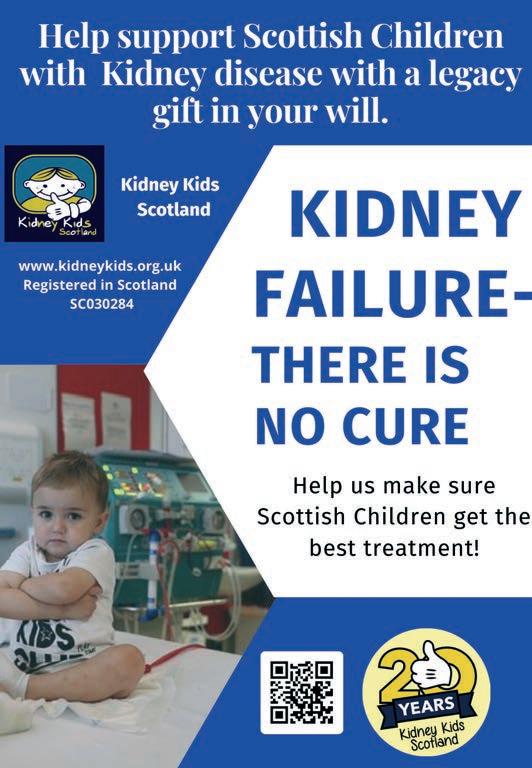

[FOR THE PAST 20 YEARS oncology researchers at Manchester University have been funded by Caring Cancer Trust (Stopcancer. health), which funds ethical, animal-free research into cancer, its non-invasive treatment, cure and prevention. They have discovered potential new causes of children’s cancer, developed new treatments for early-stage cervical cancer and are now working on cancer prevention for children and senior adults of older-age.

Increased life expectancy – people are now living longer than ever before – has been accompanied by an increase in many agerelated disorders, including cancer. Age-related damage to cells has by far the greatest influence on human health, promoting development of not only cancer, but also cardiovascular, neurodegenerative and autoimmune diseases. Novel treatments inhibiting cellular ageing have the potential to reduce the development of cancer and all those ailments simultaneously, rather than having to treat each separately. Such treatments will not just be for the benefit of older people. They will also benefit children and younger adults, since the use of chemotherapy and radiation for cancer treatment artificially accelerates the ageing process.
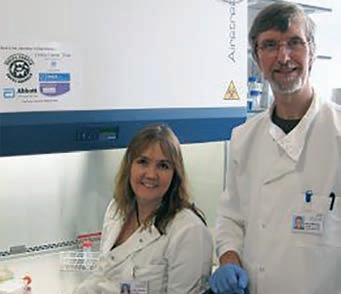
More recently Caring Cancer Trust has funded Ravan Bio Ltd, Manchester University’s spinout company, to develop a novel anti-aging treatment to prevent cancer and the other agerelated diseases. Indications for Ravan Bio’s

new therapy are that it is extremely successful, resulting in an 80% reduction in the biological age of test subjects, and has potential for cancer prevention and other age-related ailments.
Caring Cancer Trust provides support for children, adult and senior cancer sufferers from England through Exeter, Southampton, Portsmouth, Isle of Wight, Oxford and Manchester hospitals.
Now they are providing London support via North Middlesex University, Royal Free Hospital and Barnet Hospital. A number of charity ticketed concerts are scheduled at Edwin Lutyen’s magnificent St Jude’s Church in Hampstead with the Royal NHS Foundation Truust.

Stopcancer.health funds research that will increase understanding of how silent infections, lifestyle, diet, genetic predisposition and environmental pollution can lead to cancer in children and adults. Simple changes in lifestyle and diet, combined with avoidance of exposure to environmental pollution, will prevent the incidence of cancer in all age groups.
Caring Cancer Trust’s Stopcancer.health aims to identify and understand hitherto unknown cause-and-effect relationships to either limit
exposure to such carcinogenic factors or devise therapies which suppress their effects before a cancer has developed. Their research mission for cancer prevention involves:
• New life-saving cancer prevention medicines
• New therapies for early-stage cancers
• New therapies for children and later-life
• cancers
• Cancer avoidance lifestyle, diet and
• environmental changes
• Heightened cancer awareness by all
Caring Cancer Trust’s programme is entirely managed and run by unpaid volunteers. q


[PAWS2RESCUE has a simple mission: to help animals in need, wherever they are. Because the charity is entirely run by volunteers, every penny raised helps them continue this important work. If you'd like to help create a kinder world for all creatures, remembering Paws2Rescue in your will means you’ll be helping to ease the suffering of animals for many years to come.
The charity’s Alison Standbridge said: “Even though we’re based in the UK, we know that so many animals overseas face terrible neglect and cruelty. That’s why, along with finding loving homes for over 7,000 unwanted dogs and cats in the UK, we also run international projects to help reduce animal suffering, especially in places like Romania, Moldova, Ukraine and Peru where animals often endure awful conditions.
“Our goal is to ease the daily struggles these animals face by providing food, medical care and shelter. We also support rural shelters that really need help in areas where resources are limited and we’ve built our own sanctuary, to ensure traumatised animals can find peace, and set up our own vet clinics in areas where medical treatment was previously unavailable.”
But unlike charities that simply rehome, their mission is to truly end this suffering. That’s why Paws2Rescue offers free neutering for stray and owned animals, helping to prevent unwanted puppies and kittens and encouraging owners to look after their pets’ health.
To date, the charity has spayed an incredible 18,000 animals. Assuming each animal would have twelve puppies a year, that has prevented well over two million unwanted animals being born since their inception in 2013! So, while being focused on helping animals in need wherever they can right now, their dream is to create a world where there simply are no more unwanted animals.
Alison added: “Education is a big part of our mission. If young people grow up with the same old attitudes that allow cruelty to
continue, nothing will change. Our schools programme helps break this cycle by teaching children to love and respect all living creatures. Plus our veterinary scholarship programme helps young students in Romania by funding their qualification, so more vets are available to work in rural areas where animals need the most care.
“If you choose to leave a gift to Paws2Rescue, no matter how small, you can be sure that every penny will go towards helping dogs, cats and other animals in need, both now and in the future. Thank you.” q


[ NEXT YEAR’S Fundraising Convention will take place at the QEII Centre on 9-10 June. Organised by the Chartered Institute of Fundraising (CIoF), the convention is the annual opportunity to bring the fundraising community together to learn, connect and improve their performance and deliver excellent fundraising for a better world.
This year’s conference will be over two days, as opposed to the previous three, but will still pack in over 60 sessions and six tracks of specialist learning to choose from. The event is structured to give delegates the choice to glean content from a range of specialisms to broaden their exposure to many areas of fundraising, or the option to pick one single topic to learn and practise in a set period with focus and intensity.
In order to ensure that the convention stays fresh and relevant, the organisers carefully capture the feedback of delegates and the wider membership. Changes in the makeup of the convention board helps ensure delegates can expect to hear from some of the most relevant speakers in fundraising, selected by fundraisers themselves.

According to the CIoF: “We’ve ensured that the sessions respond to the rapidly changing climate in which fundraisers at all levels are working. This includes sharing expertise on the topics that matter now, as well as horizon-scanning sessions that will offer invaluable insights for your future planning.”
The past couple of years have very been difficult for the sector, facing a cost-of living-crisis and still feeling the aftermath of the pandemic. The theme of this year's Fundraising Convention is Fundraising with Purpose.
As the organisers explain: “In these recent challenging times, it has been easy for fundraisers to lose sight of the ‘why’ of their roles: the impact on beneficiaries and their role in the wider charity sector. This year’s theme will act as reminder of the reasons fundraisers do what they do. And Fundraising Convention 2025 will provide you with the forum to learn, grow and share with peers, in the knowledge that together we can best serve our causes and communities both now and in the future.”
Writing before last year’s event, Fundraising Convention Board
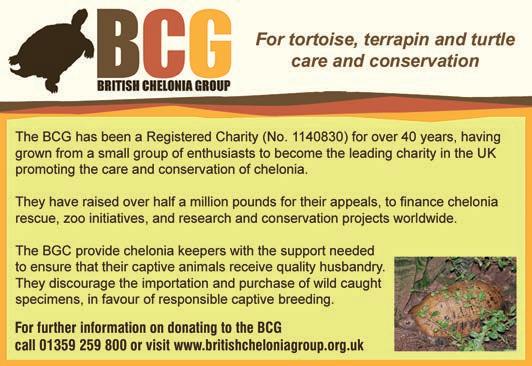
chair Jonathan Levy said: “When I am with others at Convention, I feel a much greater sense that I’m part of something bigger and so it feels more empowering, encouraging, special and significant, and ultimately, it proves to be a more impactful and long-lasting learning experience.
“One thing I’ve tried to be clear on in my time as Convention Chair is that our event is for everyone. No matter who you are, where you work, how large or small your organisation is, how long you’ve worked there, or how junior or senior you might be, your presence and your voice matters.
“If you’re still not sure about attending, allow me to further outline some of the key benefits of attending: you’ll be able to learn and share best practices; discover the latest trends from across the sector; see and hear examples of innovation happening across the sector; gain ideas to advance your organisation; find ways to improve your wellbeing and progress your career; get advice and guidance from experts; improve the way you work and discover efficiencies; and network, interact and connect with like-minded fundraisers.”
To find out more visit ciof .org.uk/fundraising-convention/home q
[ THE BRITISH CHELONIA GROUP publishes six newsletters a year containing details of meetings, short articles, news items and veterinary notes. Their journal Testudo is published annually and contains original articles and reviews on all aspects of turtles, terrapins and tortoises – their biology, conservation, welfare, veterinary care and husbandry. The group also organises symposia. As well as the yearly appeals in aid of specific international causes in chelonia research and survival, the BCG assists other worthy causes in support of its aims with grants. They invite grant applications from organisations and individuals engaged on the work of chelonia conservation – such as zoos, universities, zoologists and students in this country and overseas. q
[ALFIE’S OWNER, Pam, had been diagnosed with a degenerative disorder which affected her ability to care for him. She was also trying to leave an abusive relationship but would not do so until she had secured a safe place for Alfie.
Oak Tree Animals’ Charity managed to safely remove Alfie and brought him to their sanctuary in Carlisle. This enabled Pam to move to a more suitable and safe home, and the charity arranged for Pam to see Alfie again before he went to his new home.
Alfie and Pam are just two of the thousands of animals and owners helped by Oak Tree Animals’ Charity each year. In 2022, Oak Tree hit a new record of 4,300 animals helped and, unfortunately, this number keeps rising every year.
Their ‘A Helping Paw’ service offers pet fostering to victims of domestic abuse and the homeless. The service is run by dedicated volunteer fosterers, and since 2019 they have helped over 60 pets and 40 families. Without generous gifts in wills, the vital work to help animals and owners, like Alfie and Pam, in these devastating situations just wouldn't be possible.
Oak Tree Animals’ Charity and its wonderful supporters have been helping animals since 1909. One supporter who chose to leave a legacy to Oak Tree explained her decision: “I wish more people would support animal charities like Oak Tree and be part of their incredible work. I want to help Oak Tree Animals’ Charity continue its wonderful work for many years to come. It is comforting knowing that I will still be able to support animals long after I am gone.”
More than half of the work at Oak Tree is funded by legacies – including veterinary treatment, food, bedding, heating, enrichment, water and general maintenance, plus so much more. Every donation received means they can open their doors for another day, providing a lifeline to animals across their region. q
• If you would like to find out more about leaving a legacy, please email legacy@oaktreeanimals.org.uk or visit www.oaktreeanimals.org.uk/getinvolved/ways-to-donate/your-legacy.html


[WHILE INFLATION may have subsided, demand for charity services continues to rise along with competition for funding, research published in October by the Charities Aid Foundation (CAF) has found.
The research among 784 UK charity leaders found that 86% of the charities they lead had recorded increased demand for their services over the previous 12 months, with 54% of those reporting that it had risen by ‘a lot’. That has increased from 43% in 2023 when a similar survey was carried out.
Organisations that are most likely to say that demand has increased ‘a lot’ are poverty-relief charities (67%), human rights/equality and diversity charities (66%) and charities helping those in need (55%). The services affected include food banks, debt advice and domestic abuse support.
One chief executive of a human rights charity in the North of England said: “We’re not even meeting the demand that exists now and we’ve got 70 people on our waiting list for counselling.”
Despite improvements to the economic
climate over the last year, the research also found that over a quarter (28%) of charity leaders are uncertain that their organisation will be able to meet the rising demand. The situation for charities is exacerbated by increased competition for funding. Half of the leaders surveyed cited this as one of the main challenges facing their organisations.
The uncertainty over funding is forcing charities to change how they operate. Nearly a third (30%) of charities have either reduced the size of their workforce or are planning to do so, while 18% are not confident that they will have the funding necessary to continue their work by the end of the decade.
The chief executive of a medium-sized refugee charity in the North East commented: “We’ve already seen a lot of mergers; a lot of charities winding down and we are thinking about it quite seriously as well.”
Ashling Cashmore, head of impact and advisory at the Charities Aid Foundation, commented: “While the worst effects of inflation may have subsided, charities are still having to do much more with less. They are
dealing with ever-increasing demand which is only expected to rise as we head into winter –yet their income is not keeping up and there is less funding to go around.
“We need to work together to create a stable environment for our hard-working charities and those they support. The new government has said it wants to reset its relationship with civil society and an important next step would be to introduce a national strategy for philanthropy and charitable giving to make sure charities receive the support they desperately need.”
As an important source of data and insight to the government and a critical delivery partner for public services, charity leaders see the need to make the case for a more substantial role in advising the government on policy areas that affect their work.
Separate CAF research found that the public is supportive of charities having more of a voice in policy decisions, with a majority saying it’s important for government, businesses, charities and philanthropists to work together to deliver projects nationally (84%) and locally (85%). q
[THE IMPACT of the Budget for charities goes beyond Inheritance Tax and probate. The new government’s plans for public spending will have both direct and indirect effects on the provision of voluntary services.
Saskia Konynenburg, executive director of the National Council for Voluntary Organisations (pictured), pointed out that the Institute for Fiscal Studies called it the ‘most important budget since the 2010 austerity measures’. She outlined the main points.

Several budget measures will likely help the voluntary sector and the communities it supports. They include increased local government funding, support for individuals and carers, SEND support of £1bn (a 6% real-terms rise), funding for hardship support, education funding and funding for Holocaust education.
However, she pointed to new financial pressures on charities. In particular the 6.7% rise in the national living wage and the increase in employer National Insurance contributions to 15%, both effective from 1 April 2025, will bring significant financial pressures for charities. Additionally, the NIC threshold has dropped from £9,100 to £5,000.
“While fair wages are essential,” she wrote, “these rising costs will intensify the ‘triple squeeze’ charities face from increasing costs, reduced funding and higher demand.
“Smaller charities, in particular, may need to shift already limited resources away from essential services, putting the communities they support at risk.
“That’s why we, along with our sister councils across the UK, wrote
to the Chancellor last week to urge her to reimburse charities for these costs, as she has committed to do for public sector organisations.”
Concerns regarding the increase in NI were shared by charity investment managers Rathbones. Their analyst wrote: “This is likely to impact UK charities by straining their already limited financial resources. As many charities operate on tight budgets, higher payroll costs could force them to reassess staffing levels. This financial pressure could hinder charities’ long-term sustainability, limiting their capacity to respond to growing societal needs.”
Summing up the effects of the measures, Saskia Konynenburg opined: “Today’s budget and spending review present a mixed picture for the voluntary sector. Some measures may help communities, like more local government funding. But new financial pressures could challenge charities.
“All charities exist to help and support those who need it. So long-term investment in services that improve the lives of people is always welcome. But the ripple effect of years of austerity means many charities themselves are facing uncertain futures. So we’ll continue to advocate for the sector, including ahead of the spring spending review.
“We’re committed to resetting our sector’s relationship with government. We’re doing this through our work on the Civil Society Covenant with government and ACEVO. We know that the decisions public bodies make have a huge impact on charities and communities, and that public bodies need a strong relationship with our sector to support communities well.” q

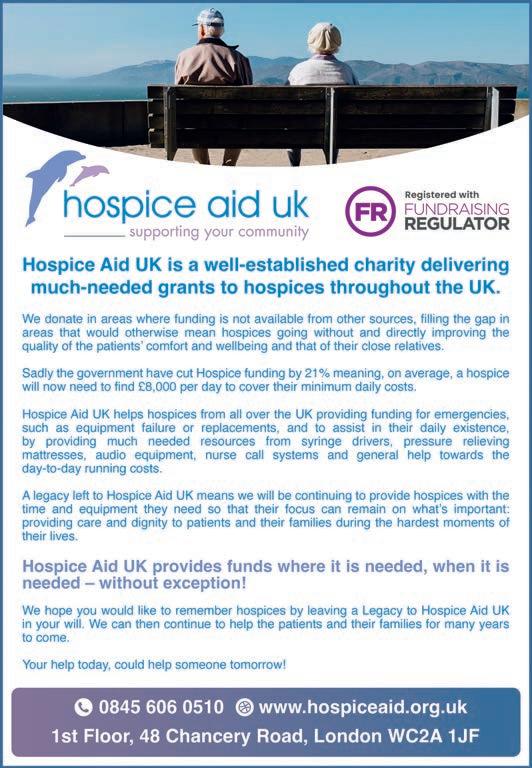


The Fundraising Regulator’s head of policy Paul Winyard explains the differences between charities and community interest companies (CICs)
[WHEN WE ARE APPROACHED by someone fundraising on the street, we assume that they are collecting for a charity. While that will usually be the case, it’s becoming increasingly common for other organisations, most notably community interest companies, to be fundraising from the public for good causes.
Both charities and CICs exist to benefit the community, but they operate under different legal rules and reinvest profits differently. It’s important that members of the public know where their money is going and how it will be used by the organisation doing the fundraising.
Understanding the key differences between charities and CICs can help donors make an informed decision about whether to donate to a particular cause.
What is the purpose of charities and CICs?
Charities are organisations established exclusively in law for charitable purposes and must provide a public benefit. Their activities can include areas such as education, poverty relief, healthcare and the advancement of the arts. Charities are typically providers of relief or services without a commercial objective.
CICs are a type of limited company designed to benefit the community rather than private shareholders. They can engage in commercial activities and generate profits, but the majority of profits must be reinvested into the community or the CIC’s social objectives. They are businesses with a social mission. CICs that do street fundraising can look and feel very similar to charities, but they should not say they are fundraising for charity.
Charities are regulated by the Charity Commission for England and Wales, the Office of the Scottish Charity Regulator, or the Charity Commission for Northern Ireland, depending on their location. They must adhere to strict reporting and accounting standards, which help to promote transparency and public trust. That helps to provide assurance about how funds raised are used.
CICs are regulated by the CIC Regulator and Companies House. They are required to pass a ‘community interest test’ to ensure their activities benefit the community. CICs must prepare an annual report to demonstrate their on-going community benefit but their regulation is much more light touch than the regulation of charities.
Fundraising by charities, and organisations with entirely or predominantly charitable, philanthropic and benevolent objectives such as CICs, is regulated by the Fundraising Regulator through the Code of Fundraising Practice. Charities and CICs must fundraise in a
legal, open, honest and respectful way, and they must follow the rules set out in the code.
do charities and CICs distribute
Charities must reinvest all income into their charitable objectives and cannot distribute profits. That ensures that all resources are used for public benefit. CICs have an ‘asset lock’, which means that their assets and profits must be used for the community’s benefit. They can distribute some profit in the form of dividends, but that is capped at no more than 35% of the CIC’s profits. That ‘business model’ can help CICs attract investment while ensuring that the majority of profits are reinvested into their social mission.
How are charities and CICs treated for tax?
Charities can claim a range of tax reliefs, including Gift Aid, business rates relief, Corporation Tax relief, Inheritance Tax relief and VAT reliefs. Gift Aid in particular can be attractive to donors as it increases the value of donations and offers them tax relief at the same time.
CICs do not enjoy the same tax benefits as charities. Like charities, CICs can access a variety of funding sources, including grants and social investment, but donations will be less tax efficient for some donors.
It’s important that donors can make an informed decision about whether to donate to a particular cause. That includes understanding the purpose of the organisation doing the fundraising and how money raised is used and reinvested.
Charities and CICs must say what type of organisation they are on fundraising materials, such as signs, websites and printed material. Charities must include their registered charity number on all fundraising materials. Similarly, CICs must provide the company’s name on all company documents, publicity and letters.
Both CICs and charities need a licence from the local authority – or the Metropolitan Police if in London – to raise money on the street, or permission from the owner to fundraise on private sites. They must also make clear whether they are asking for donations or selling something which might require a street trading licence, which they would need to apply for with the relevant local council.
Donors can check if an organisation is committed to good fundraising practice by looking out for the Fundraising Badge on fundraising materials, and by checking the Fundraising Regulator’s online directory to see if an organisation is registered with us. q

[“I’VE HAD EPILEPSY all my life, so I thought I’d leave something for The National Hospital because of all the treatment I’ve received over the years,” said Richard Atterwill, 79, who has decided to make a legacy pledge to the National Brain Appeal, having been treated at the National Hospital for Neurology and Neurosurgery in Queen Square, London, for more than six decades.
“I first visited The National Hospital in 1958, when it was still called The National Hospital for the Relief and Cure of the Paralysed and Epileptic,” recalls Richard who was 13 when he received his diagnosis at the hospital. “I remember it having heavy, ill-fitting wooden doors that didn’t close properly. We sat outside on a row of chairs waiting for our names to be called. So, if you were keen at listening, you could hear other people’s appointments! But treatment at The National Hospital has aways been outstanding.”
The first consultant to treat Richard was celebrated neurologist Professor MacDonald Critchley, one-time president of the World Federation of Neurology and author of 20 books and more than 200 published articles on neurology.

“He was an eccentric man,” said Richard, “He always used a ledger for writing and used to dip his quill into an inkwell. He was very smartly dressed generally, but he used to cross his legs and – bless him – he didn’t realise or didn’t want to realise that the soles of his shoes were coming away: like alligators, both of them! He was very nice.”
Since those early days Richard has been under the care of numerous
consultants, most recently Professor Matthias Koepp, whom he still sees for bi-annual checkups. He has seen a lot of changes in prescribed treatments and medications over the years as well.
“Originally the only drugs were Luminal and Tofranil. In those days I was taking about 12 tablets a day. I used to wake up in the morning and feel a bit tired, and then I’d take my tablets and be knocked out for the day.”
Richard had attended St Benedict’s School in Ealing since the age of eight, but the impact of his epilepsy, including violent bouts of vomiting, led him to leave school aged 13.
“There was a meeting between the council and psychologists and so on; and they voted about five to three that I should no longer be at school and could work at my father’s business with no pay. He was a turf accountant and had offices in Jermyn Street, London. I did clerical work there or talked on the phone to customers.”
Today, Richard’s epilepsy is well-controlled and he has learned to live with what he named ‘The Unwelcome Visitor’, or ‘TUV’.
“There have been ups and downs: with epilepsy, one minute you’re there and one minute you’re gone; and you wake up with a paramedic each side of you,” he said. “Sometimes I get lots of auras or attacks out of the blue; but I always aim to look on the bright side of life. It hasn’t stopped me holding down jobs over the years.”
For 21 years Richard worked for a manufacturer of car accessories, TriCo Folberch, where he met his wife Lorna in 1985.
“I’ve been lucky, apart from two jobs, where I was sacked because I had epilepsy,” he explained. “In those days there was no protection for people with disabilities.”

His final role was with the Metropolitan Police and he retired in 2010 to care for Lorna, who had been diagnosed with Alzheimer’s at Queen Square some years before.
“My dear wife’s gone now,” he said. “She died in January 2014, but I lost her before she died because she had developed Alzheimer’s in 2004, and you don’t get another decade with someone who’s got Alzheimer’s; you just drift further apart.”
Making a legacy pledge allowed Richard to make provision for his own future care before making a charitable gift.
“I had a second stroke three years ago, and if I ever need care at home I have to put that before anything else. So I’ve got a certain amount put aside in my bank to cover care costs; and now that’s in place I can put an amount towards The National Hospital. I’ve left it up to the National Brain Appeal to decide what it goes towards. It was just a thank you to the hospital.” q
• To find out how you can leave a gift in your will, visit www.nationalbrainappeal.org/giftsinwills
[
UNFORTUNATELY many animals in Greece have a very short and miserable existence. There are millions of stray, sick and injured animals with no access to things we take for granted in the UK such as food and water, shelter, vaccinations and basic veterinary care. Although there are animal welfare laws, they are seldom, if ever, enforced and therefore thousands of animals suffer needlessly. In the face of this suffering, Animal Action Greece has been working to improve the lives of Greece’s homeless and vulnerable animals since 1959.
We care for street cats and dogs; provide vital veterinary, dental and farrier services to working and abandoned donkeys, horses and mules; and rescue, treat and rehome animals affected by emergencies.
Since we were established, we have relied on the generosity of animal lovers to undertake this vital work, including gifts left in wills. By supporting us with a legacy today, your love of animals will live on and allow us to:
• Deliver our unique equine outreach programme, which provides
• vital veterinary care to working horses, donkeys
• and mules.
• Support stray cats and dogs, ensuring they are
• neutered, vaccinated and fed and that they have
• access to veterinary care when they are injured
• or ill.
• Where possible, provide support in emergencies
• and in support of specific cases to rescue and
• rehome abandoned or neglected animals.
In December 2023 we were called to a critical situation in Topieros, in Northern Greece, where more than 600 stray dogs were living on a rubbish site in horrendous conditions (pictured right). Many
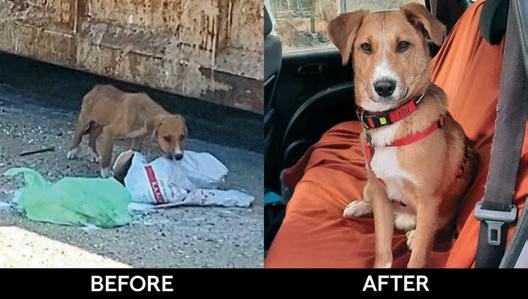
of the dogs were reduced to skin and bone, covered from head to tail in fleas and ticks, and suffering terribly from deadly injuries and ailments. It was a horrific sight.
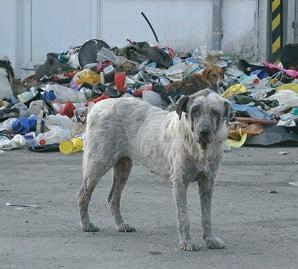
We responded immediately, providing urgent veterinary care and food and implementing a campaign to ensure all of the dogs were sterilised, stopping the birth of more homeless puppies.
Our efforts had an immediate impact and many of the dogs managed to recover and have been supported by our local partner to find new forever homes. Jimmy (pictured above), once scared and alone desperate for scraps of food, is now happy and healthy in his forever home in the Netherlands. By supporting us with a gift in your will, you’ll be creating a better future for animals just like Jimmy. It’s the perfect way to ensure that your lifelong love of animals lives on. q

[ AT A TIME WHEN many charities have vacancies for trustees on their boards, trustees themselves are overwhelmingly likely to recommend trusteeship to others. In fact, eight out of 10 trustees say they are likely or very likely to recommend the role.
That was the finding from research into trusteeship, conducted as part of a collaborative project between the Charity Commission and Pro Bono Economics (PBE), which aims to better understand who trustees are and what skills they bring to the role.
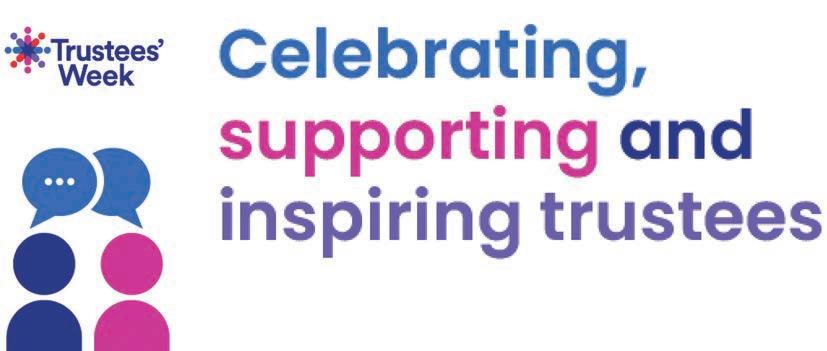
The findings were published to coincide with Trustees’ Week in November, an annual celebration of the achievements of almost one million trustees across the UK, recognising the time, commitment and effort they bring to lead and manage their charities.
The week included an ‘inspiring new trustees day’, when the commission and its partners encouraged more people to consider becoming trustees. Trusteeship offers a unique way for people to bring their passions to life, make a difference to a cause they care about and develop new skills. Social media activity brought the benefits of trusteeship to life, including videos of current trustees explaining what they gain from their roles and myth-busting common barriers.
Speaking at a Trustees’ Week event organised by the accountancy and business advisory firm BDO, Charity Commission chief executive David Holdsworth said: “Trustees are a driving force in charities, whose work is often unseen, taking place behind the scenes of charities’ front-line work. Trustees’
Week gives us a welcome opportunity once a year to bring their work into the limelight, to celebrate and thank trustees for the contribution they make, and support and encourage more people to step up and take on the rewarding role.
“These early findings offer us some confidence that, while trusteeship is no doubt demanding and can be challenging, most of those who serve as trustees do so, at least in part, because they too benefit. To all who are not already trustees – please consider volunteering today.”
Speaking in support of Trustees’ Week, BBC broadcaster Reeta Chakrabarti, a trustee of two charities, gave advice to prospective trustees: “Think about your own interests and values, and make sure that they align with those of the charity. Be aware that being a trustee is a legal responsibility and that you need to commit time to the job. But also remember that it is hugely rewarding.”
Research participants reported that one of the major benefits of their roles in a charity is that it allows them to use existing skills in a new context (66%). Trusteeship also helps
[THE MISSION of Three Counties Dog Rescue is to accept, care for and find homes for unwanted, lost and stray dogs and cats and to ensure their wellbeing afterwards. The charity was founded in 1971 and since then they have improved the lives of over 7,800 dogs and cats.
Before rehoming, all animals are vet checked, neutered, vaccinated, microchipped and kept in suitable conditions. Rehabilitation costs are a major part of the charity’s annual expenditure of over £200,000. Healthy animals are never put down. As part of that non-destruction policy, several elderly dogs are kept in long term foster care. However, this means that the charity can incur large veterinary costs to maintain a dog’s health while they await a new permanent home. They now provide boarding and cremation services with profits supporting the Rescue.
Every penny raised goes to improving the lives of dogs and cats. Three Counties Dog Rescue is run entirely by voluntary and unpaid helpers, who also meet their own expenses. q
them to be more connected to their local community or to a movement that’s important to them (65%). Only 2% said that trusteeship offers no benefit to them and less than 1% would not recommend taking on a trusteeship to others.
Highlighting the benefits of being a trustee, Reeta Chakrabarti added: “Being a trustee gives me an insight into worlds that I am fascinated by, and gives me an opportunity to learn more about them and also to influence – to a certain degree – the direction the charity takes.”
Matt Whittaker, CEO of Pro Bono Economics, said: “Trusteeship isn’t just about giving back; it’s about gaining, too. This early snippet from PBE’s research reaffirms that being a trustee not only connects people to causes and communities they care deeply about, but people feel that it also sharpens their skills. That 80% of trustees recommend the role speaks volumes. We’re looking forward to releasing the full data set and analysis soon.”
The full data set with analysis is expected to be published early in the New Year. q


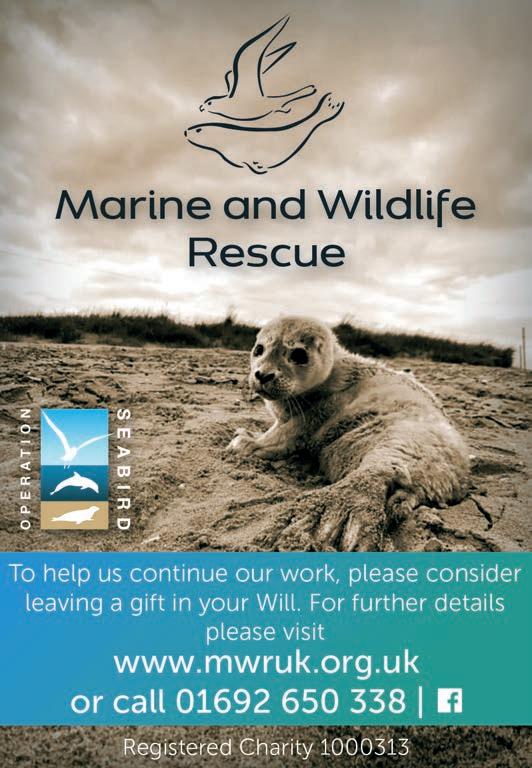

[
ONE OF THE ISSUES that is attracting most attention in the charity sector today is artificial intelligence, or AI. References to AI are everywhere, together with the debate about the dangers.
Ioan Marc Jones, content editor at Charity Digital – the organisation set up in 2001 to help other charities to use digital technology – wrote on the organisation’s blog: “Generative AI content has been the most talked-about topic of 2024. But the tech presents risks around ethics, accuracy and quality. People are turning to ChatGPT, Bard, Scribe and a million other competing platforms to create their content. But there is a small problem: a lot of that content isn’t particularly good. Or, worse, the outputs are inaccurate, outdated or even unethical.”
Another Charity Digital contributor, Laura Stanley, has also addressed the issue. She wrote: “Artificial intelligence is poised to be a defining technological force of this decade, driving transformative changes across society and industries. With each breakthrough, capabilities and benefits increase, but so do risks and the potential for unintended consequences. In 2024, there are increasing calls to establish frameworks for responsible use, so we can ensure AI benefits society while safeguarding against its risks.”
While the technology has been around for longer than most of us realise, its capabilities have become more widely accessible in the current decade.
Laura Stanley points out: “ChatGPT, one of the most well-known generative AI tools, was first released at the end of 2022, and over the last two years, we have seen similar AI technologies grow and grow. A 2024 survey from Charity Excellence found that up to 90% of charity professionals are using it on an individual level, while three in five charities are using it organisationally.

“The gap between individual and organisational use, however, speaks volumes to how new the technology is and the caution around early adoption. The 2024 Charity Digital Skills report found that only 31% of charities saw using AI as a priority for their organisation in the next year.”
She points to a number of drawbacks that could lead to scepticism.
“Generative AI pulls information from across a variety of sources, which can sometimes result in hallucinations, where the outputs are inaccurate or just plain wrong,” she wrote. “It can also repeat biases or limitations found in the source material it pulls from, so charities should apply human oversight to ensure the accuracy and validity of the content before using any of it.
“Secondly, in a similar vein, charities should be aware of issues around plagiarism. Copying content directly from generative AI could lead to copyright infringement or plagiarism even by accident.
“Thirdly, generative AI causes concerns around the quality of content. Written content created by generative AI, in its current form, is pretty easy to spot because of its plain, and often dull, responses.”
Despite the risks and ethical considerations, the general public are supportive of charities using AI. Research carried out by the Charities Aid Foundation (CAF) found more people viewed the technology positively than negatively, with a ‘net positivity score’ of +15%.
More than a quarter (28%) thought the most exciting opportunity was how AI could help with a faster response to disasters, and 25% thought that it was the potential ability of AI to allow charities to help more people.
Moreover, the research found that people who donate more to charity tend to be more positive about charities using AI, with those considered higher donors in their country being more likely to appreciate the benefits.
Speaking on the subject at a plenary session of Microsoft’s Global Nonprofit Leaders Summit on 31 January, CAF chief executive Neil Heslop said: "AI must not be the privilege of the few. We must work together with the technology industry to ensure it is accessible for small and large charities. Digital advances have great potential to support charities to further their missions and accelerate social progress. As a starting point, AI could help target disaster relief more effectively, decrease the time spent on administrative tasks and improve operations.
"Charities need to also remain alert to the risks, stay close to the human essence of their cause and communicate clearly with donors to further social impact."
For charities thinking about how they can balance the problemsolving capabilities of AI with other concerns, digital consultancy Reason Digital hosted an online session on AI ethics at Charity Digital’s AI Summit to help elucidate matters. They also have a Skills Hub that can help charities navigate AI and other important digital areas. It can be accessed at reasondigital.com/rd-skills-hub/
The Charity Excellence Framework also has an example UK AI policy template intended for use by charities, with links to all its other AI governance and policy templates for non-profits. According to Charity Excellence: “This simple UK charity AI policy template is mainly for small charities.”
The template begins: “This policy applies to all trustees, other volunteers, employees, contractors and third-party representatives working on our behalf. Its requirements should be reflected in other policies and procedures, agreements and contracts, as necessary.”
The template can be downloaded from www.charityexcellence.co.uk/ charity-ai-policy-template/ q
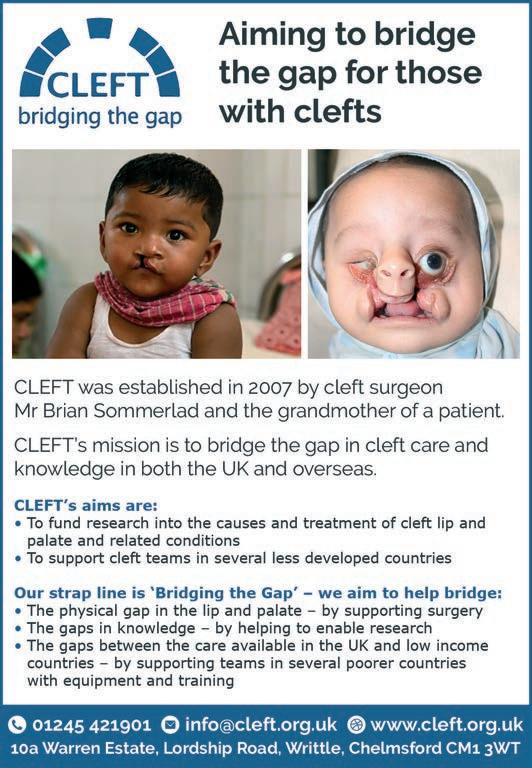

[TODAY, ONE IN 700 BABIES in the UK are born with a cleft lip and palate, the most common form of birth defect.
The impact on a child’s life as they grow is profound. It may affect not only the way they look, but also their speech, hearing and dental development. And it can leave deep psychological scars.

In the developing world, patients with clefts are frequently not operated on until later in life, if at all. As a result, they may be malnourished and unable to talk well or hear properly. Often, they will be social outcasts.
At CLEFT, our vision is of a future where clefts are preventable. Until we get there, we want to improve the lives of those born with cleft lip and palate – in the UK and in poorer countries around the world.
By funding research, we continue to make headway into understanding why clefts occur and to deliver pioneering new treatments that deliver kinder, more effective and more efficient care for children with cleft lip and palate.
By supporting the development of cleft centres in low and middle-income countries we aim to give children born with clefts in these poorer countries the same opportunities available to children in the UK. Each donation takes us a step closer to reaching our goal. All gifts could have a direct impact on changing the lives of many hundreds of thousands of babies and children around the world. q

[FOR OVER 80 YEARS Ferne Animal Sanctuary has given hope to animals in desperate need, working tirelessly to find forever homes for those who have never known warmth and safety or offering lifelong care for sanctuary residents.
Much of the support their animals receive – including food, a comfortable bed and veterinary care – is only made possible thanks to the generosity and support of those who believe that every animal deserves a second chance.
By leaving a gift in your will to Ferne Animal Sanctuary, you create a lasting impact that extends far beyond your lifetime. Your legacy will ensure that countless animals receive the love and care they deserve, providing a lifeline for those who have nowhere else to turn.
Not only will your gift secure a brighter future for those who need it most, but it’s also a testament to your unwavering dedication to the wellbeing of animals. Consider leaving a gift to Ferne Animal Sanctuary and help to give every animal a chance to feel safe, happy and loved. q
[CYBER ADVISOR is the National Cyber Security Centre’s (NCSC) scheme to help small and medium-sized organisations find reliable, cost-effective cyber security consultancy. Cyber Advisors are assessed against whether they can understand and communicate with small organisations to give proportionate and sensible cyber security support.
Cyber Advisors are instrumental in raising cyber security awareness within the charity sector. Many make presentations at conferences and offer advisory work and awareness sessions, often going on to guide charities through the Cyber Essentials certification process.

common cyber attacks. Cyber Essentials Plus is based on the same five technical controls as Cyber Essentials, but also includes a technical audit of the IT systems to verify that the controls are in place.
The sole delivery partner for the National Cyber Security Centre’s Cyber Essentials scheme and Cyber Advisor scheme is Worcestershire-based IASME. They explained: “Many charities are working with fragile financial models, and the persistent economic pressures often make it necessary to prioritise critical operational expenses such as staff salaries over investing in cyber security measures. In this challenging landscape, Cyber Advisors are instrumental in shifting the focus of small to medium-sized charities from a reactive to a proactive stance on cyber security.
“The introduction of the UK governmentfunded Cyber Essentials programme was a game-changer, providing these advisors with the resources to guide and support small charities in making substantial progress in their cyber security efforts by achieving Cyber Essentials Plus certification. The 2022-23 programme was aimed at small, vulnerable organisations, and covered the cost of certification, as well as the fees for a Cyber Advisor to help them achieve Cyber Essentials Plus.”
Cyber Essentials is an annually renewable certification scheme consisting of five controls that will reduce the impact of the most
One Cyber Advisor is Simon Whittaker of Vertical Structure. Simon said: “I encourage small charities to seek out the reputable advice and support that is available for free. A good place to start is the National Cyber Security Centre’s website which has numerous guides for small organisations and charities.”
Another, David Pitre from CSIQ, added: “Cyber Advisors empower non-profit organisations by providing them with the knowledge to safeguard their sensitive data and digital assets. Since many charities have limited funding and access to cyber security experts, many are unaware of their risks and often feel disadvantaged in light of the everincreasing risk of a cyber attack.
“As a Cyber Advisor, I work with non-profit organisations to identify and mitigate their industry-specific cyber security risks. Our focus is on creating cost-effective plans that significantly reduce the threat of commodity attacks such as ransomware, malware and phishing. These strategies provide a sense of security, knowing that your organisation is less vulnerable to cyber criminals’ common tactics.
“We recently helped a small non-profit implement basic staff training and cyber hygiene procedures, substantially decreasing susceptibility to phishing attempts following a
[ HYPO HOUNDS provide a viable health care alternative for children and their families by training a Diabetic Alert Dog to detect the subtle changes in the child’s blood sugar levels.

The dogs are trained to alert parents when the child’s sugar levels drop dangerously low or rise too high. This not only impacts on the child but also on the family’s ability to function as a unit, with the registered carer becoming the dog.
Hypo Hounds work is becoming nationally recognised and is literally saving the lives of children – one sniff at a time. q
simulated phishing attack. Charities can strengthen their defences against cyber attacks without high costs by engaging with a Cyber Advisor.”
Chani Simms from MetaDefenceLabs explained the basic cyber security protection she offers to resource-limited charities.
It includes:
• Gap Analysis: Assessing
• current cyber security measures
• to understand gaps in meeting
• Cyber Essentials requirements.
• Scope Definition: Identifying what IT
• infrastructure is in scope for Cyber
• Essentials, including BYOD and cloud
• services.
• Technical Controls: Support in setting up
• essential security measures like firewalls,
• secure configurations, malware protection
• and user access control, including MFA.
• Training: Advising leadership and
• educating staff on cyber security best
• practices, like secure passwords and
• phishing awareness.
• Policy Development: Creating key security
• policies such as password and device use
• policies.
• Self-Assessment Assistance: Helping
• charities accurately complete the Cyber
• Essentials self-assessment.
• Vulnerability Management: Ensuring all
• devices and software are regularly
• updated, with critical security updates
• applied within 14 days.
Andrew Spencer from Evolve North said: “Cyber Advisors are evaluated in their skills of providing practical advice which is both easy to understand and appropriate for the size of the charity they are working with. The advice will often prioritise on low or no-cost solutions which are simple to implement and manage, and effective for your charity’s specific needs.”
To find a Cyber Advisor near you visit iasme.co.uk/cyber-advisor/find-a-cyberadvisor/ q



[IT WOULD BE TEMPTING to try to explain all that is The Fox Project, but that would look a little like a shopping list: wildlife information bureau, humane fox deterrence consultancy, wildlife ambulance service, wildlife hospital etc.
Indeed, it would be more straightforward to concentrate on what’s going on right now, as we approach the end of the annual UK red fox breeding season, having received something approaching 350 sick, injured and orphaned fox cubs.
Gilbert was one of our first cubs this year. He is pictured gazing thoughtfully out of his pen at the setting sun, perhaps quietly wondering how he can get out into the big, wide world and do what he wants, rather than what we want.
Founder of The Fox Project Trevor Williams takes up the story: “Gilbert was picked up by a member of the public and handed into a vet surgery, who called us to take him on. It is possible he shouldn’t have come in. Sometimes, folk pick up what appears to be an abandoned cub when it may simply have strayed a short distance from the breeding earth and, if left alone, will soon be recovered by the parents. However, once in, we found he was a keen bottle feeder and, because baby animals need the company and warmth of others, he was grouped with Marshall, Betsy, Helle and Miss Heversham!
“Cubs grow fast and a brooder will only hold them for so long before their accommodation needs to be upgraded to steel vet cages. And they, too, are soon inadequate for curious, active youngsters who are developing speed and agility –albeit wobbly speed and agility!
“The next step was day release in a two-storey chicken run and back in the warm at night for a bedtime bottle and a bowl of dog food. They loved that! And then they were moved to a larger foster pen, where muscles could develop and they could feel the weather.
“As soon as Gilbert and Co were weaned off the bottle, the bond with their feeder was broken and they were transferred to one of our team of fosterers. These volunteers have pens in their gardens where they can look after the needs of a litter of cubs without getting directly involved with them.
“And that is where the serious work begins in encouraging cubs to revert to wild in preparation for late summer release. Given all the changes, our cubs should be growing suspicious of people in general; and their first instinct when a fosterer approaches is to run into the hutch provided. If they begin to get ‘waggy’ with the fosterer, we move them to another. And we keep doing that right through the summer.
“From mid-June, we start to move them onto pre-arranged rehab sites – no more than five cubs per site. Those are predominantly rural: often farms and smallholdings.”
The cubs are now the responsibility of the rehabber that owns the property. Their job is to feed, water and clean out the pen and never to speak. A cautious cub is a cub that will live the longest: if you’ve made a cub tame, you’ve undermined their potential for a safe and long life.
After four to six weeks on site the cubs are used to the sights, sounds and smells of every other animal in the area and vice versa. That means they can safely be released without danger of attack. Come the night of release, the rehabber simply leaves the door open and walks away.
Trevor continued: “Timing for this final part of the procedure is governed by nature. Just as the breeding season fluctuates a little every year, so does natural dispersal, when wild-raised cubs – by now around five months old – will fan out from their home territory to locate their own: a vital process to avoid in-breeding and necessary if they’re ultimately to find a mate. Release of our cubs is timed to coincide with that point.”
Gilbert and his chums were released from a smallholding in East Sussex. Initially, they all returned for support feeding, but it’s seldom needed for long. As they begin to use the instincts nature provided them with, the cubs return less and less frequently.
“When they no longer return,” said Trevor, “we must hope they’re doing well. And we generally know they are, because we often see them around for months, or even years. Not that it’s any of our business. We’ve given them that all-important second chance and whatever befalls them, good or bad, is down to them.” q

[LEGACIES MEAN SO much to the team at Last Chance Animal Rescue. These wonderful gifts have helped them to rescue, rehabilitate and re-home so many abandoned, abused and unwanted dogs, puppies, cats, kittens, rabbits and guinea pigs who otherwise would have had no future.
The charity understand the wishes of its kind benefactors who have considered them in their Wills. A spokesperson said: “We know they want their generous gift to us to be used directly to save lives, provide the very best of care and to find loving homes.

“Legacies really do provide the gift of life and Last Chance Animal Rescue can now, after much planning and prudent use of funds, offer our life saving services to so many more needy pets. We are delighted to announce we now have a second rescue and rehoming centre in Kent, giving hope and a true last chance to so many.
“Sadly we cannot thank those who have enabled this wonderful achievement but are extremely grateful to all those who are currently considering helping us now and in the future to continue our work.” q Pixie

[ANIMAL CHARITY Wild Futures rescues and offers sanctuary to monkeys who have suffered abuse and neglect. They are dedicated to protecting primates and their habitats worldwide – primates are endangered due to climate change, habitat destruction and the bush-meat and pet trades.
For some species, it is too late. The future of all that remains lies in our hands, so leaving a legacy to Wild Futures is the gift of life and a future for primates and our wonderful planet. Wild Futures’ holistic approach makes them unique – providing sanctuary to rescued
monkeys, supporting projects overseas, campaigning for primate welfare, educating to protect primates worldwide and promoting a sustainability and ethical ethos.
They receive no government funding, so the generosity of those that remember Wild Futures is essential to enable them to continue their work. A legacy can be the gift of a life worth living and a wild and safe future for all. q
• For more information call 01503 262532, email giving@wildfutures.org or visit the webiste at www.wildfutures.org


[THE CHARITY
investigation into The Captain Tom Foundation has found repeated instances of misconduct and/or mismanagement by the family of the late fundraiser, who set up the charity in his name.
The official report, published on 21 November, is highly critical of the conduct and actions of the charity’s former trustee and CEO, Hannah Ingram-Moore, and a former trustee, Colin Ingram-Moore. It sets out evidence of serious failings in the charity’s management, including failures to act solely in the best interests of the charity and to effectively identify and manage conflicts of interest.
The report, which was opened in June 2021, found that Mr and Mrs Ingram-Moore, who are now disqualified from serving as charity trustees, are responsible for a ‘pattern of behaviour’ which saw them repeatedly benefitting personally from their involvement in the charity. The failure to manage conflicts of interest arising from Mr and Mrs IngramMoore’s link to each other and the charity’s links to their private companies happened
repeatedly and led to direct and indirect private benefit for the family.
The report is also critical of the charity’s unconflicted trustees, who it finds did not always have sufficient oversight and control of the administration of the charity. However, the inquiry notes that their ability to manage conflicts of interest was limited by the failure of the Ingram-Moores to inform them of potential conflicts of interest as they arose.
The report concludes the non-conflicted trustees are responsible for mismanagement, but that it did not warrant any further regulatory action.
In its statement following the report’s publication the Charity Commission related examples of the couple’s misdoings. They included their handling of publishing deals for books authored by the late Captain Sir Tom, which implied that donations from sales would be made to the charity carrying his name, when no benefit accrued to the charity, and a payment of £18,000 to Mrs Ingram-Moore for judging and presenting an award named after Captain Tom.
They also referred to the widely-reported affair of the use of the charity’s name in an original planning application for a building constructed on their private land, which was subsequently demolished by order of the local authority. The inquiry finds that the couple used the charity’s name inappropriately for private benefit, and that this amounted to misconduct and/or mismanagement.
David Holdsworth, CEO of the Charity Commission, said: “Captain Sir Tom inspired a nation and reminded us what service to others can achieve even in the most challenging of times. His determined fundraising efforts, and the incredibly generous public response, brought a smile and hope to many of us during the pandemic. We should remember his achievements and how grateful NHS Charities Together is for the £39m he raised for the causes they support.
“Sadly, however, the charity set up in his name has not lived up to that legacy of others before self, which is central to charity. Our inquiry report details repeated failures of governance and integrity.” q

[ AT The Humane Slaughter Association (HSA), a crucial part of their work is to advance and promote the use of humane methods for the transport and killing of farmed animals globally through research and education.
One of the ways that they do this is by funding research that aims to improve animal welfare beyond the farm gate.

At the end of 2023, HSA awarded £10,000 of funding to a project aiming to improve chicken welfare during transportation in Malawi.
What are the current welfare issues?
Traditionally in Malawi, groups of up to 50 live chickens are transported to markets upside down whilst suspended from the handlebars of bicycles. The chickens often continue to hang upside down from the handlebars in excessive heat for several hours after reaching the market.
Such methods of transport and handling can result in broken wings and legs, weakness and at least a 10% mortality rate.
What does the project aim to achieve?
In the current project, the Lilongwe Society for the Protection and Care of Animals (LSPCA) are working to replace the traditional method of transporting chickens with welfare-friendly crates. This simple change allows chickens to be transported far more humanely.
Twenty local craftspeople from various areas of Lilongwe will be trained to make bamboo-woven crates to ensure a consistent supply.

What impact will this have?
In a pilot study conducted by the LSPCA, the locally-produced crates proved so popular with chicken vendors that the trial had to be doubled to accommodate the increased interest. It is hoped that with HSA funding, a further 500 chicken vendors will receive both the training and crates. This has the potential to improve the welfare of hundreds of thousands of chickens annually.
Will you help make practical and lasting improvements to animal welfare beyond the farm gate?
HSA is an independent charity and receives no government support or statutory funding. They rely solely on the generosity of donors and supporters.
With your support, HSA can create lasting and tangible change for food animals all over the world. To help improve animal welfare beyond the farm gate, please donate by visiting www.hsa.org.uk/springappeal q

[THE Universities Federation for Animal Welfare (UFAW)’s vision is of a world where the welfare of every animal affected by humans is maximised through a scientific understanding of their needs and how to meet them.
UFAW promotes a scientific approach to advancing animal welfare by:
• discovering what matters to animals
• developing scientific solutions to animal welfare problems
• disseminating evidence-based information as widely as possible so that it can be used to make real-world improvements to the lives of animals.
One of the ways that they have been doing this is through their work on genetic welfare problems of companion animals.
What’s the issue?
In recent years, the problem of health issues related to genetic diseases and unsuitable breeding has been cited as a top welfare concern for the veterinary profession, animal welfare professionals and others. Some genetic diseases arise due to random mutations that become established in a breed, but in other cases welfare problems can occur as a direct result of features being selected. Perhaps the most obvious example is the breeding of brachycephalic (flat-faced) dogs.
Despite a number of organisations highlighting the potential issues faced by flat-faced breeds such as breathing, neurological, skin, ear and eye problems, the number of these dogs in the population

is rising. UFAW recently funded a study that aims to understand why such animal welfare campaigns may fail, with the aim of laying the foundation for more effective educational material and campaign strategies for breeders and potential owners.
Using the results of this and other studies, they will continue to update their existing website dedicated to providing information for prospective pet owners, breeders and others with the aim of reducing the severity and incidence of breed-related welfare problems in companion animals.
UFAW is an independent charity and membership society. They receive no government or statutory funding and rely solely on the generosity and support of donors.
This study is one of many supported by UFAW which uses science to create quantifiable, significant change.
If, like UFAW, you believe in science in the service of animal welfare, please consider making a donation. Your donation, however big or small matters, just as the welfare of every animal does too. Visit www.ufaw.org.uk/springappeal q



[ON 6 NOVEMBER the Social Enterprise Awards Scotland 2024 winners were revealed at a prestigious ceremony held at the Scottish Parliament in Edinburgh. The awards, hosted by Social Enterprise Scotland, celebrate the incredible work and achievements of social enterprises, employees, volunteers and organisations supporting the sector in Scotland.
This year, 10 award categories celebrated the breadth and diversity of Scotland’s thriving social enterprise sector, which continues to lead in driving positive social and environmental change. From tackling poverty and homelessness, supporting diverse communities and upskilling Scotland’s future generations in digital skills and environmental awareness, this year’s winners exemplify the power of business for good.
Chris Martin, CEO of Social Enterprise Scotland, said: “We’re excited to reveal the winners of the Social Enterprise Awards Scotland 2024 and to celebrate the extraordinary impact of social enterprises driving positive social and environmental change across the country.
“Each finalist and winner has shown remarkable dedication to building a fairer, more inclusive Scotland, and we’re honoured to celebrate their achievements and look forward to supporting their continued success and innovation.
“I’d also like to extend our heartfelt thanks to our sponsors for their support in making these awards possible. We’re fortunate to be part of such a supportive community, and delighted to be able to celebrate our sector together.”

The coveted Social Enterprise of the Year 2024 Award was presented to Isle of Gigha Heritage Trust, a community-owned trust and social enterprise promoting sustainable tourism and preserving the natural environment. The Courtyard Pantry Enterprise, a social enterprise in Glasgow that works to reduce the effects of poverty using food as a vehicle for change, scooped the One to Watch Award for new social enterprises.
Paul Sweeney, MSP for Glasgow (Region), said: “I was delighted to sponsor the Social Enterprise Awards in the Scottish Parliament, showcasing the diverse range of social enterprises across Scotland. The social enterprise sector plays an important part in affecting wider change, contributing to efforts to tackle poverty and in upskilling future generations.
“It was excellent to recognise those crucial efforts at the event and I look forward to seeing more of the positive impact the sector delivers ahead of next year’s ceremony.” q
[THE AIR AMBULANCE SHOP in Melton Mowbray has been crowned the winner of the UK’s Favourite Charity Shop Award. The East Midlands charity shop claimed the title at the 25th Anniversary Gala Dinner of the Charity Retail Association, held in London on 19 November. The shop was one of 12 area winners in the running to receive the title. Two runners up were also announced on the night: St Peter’s Hospice in Bristol and Shooting Star Children’s Hospices in Godalming.
The awards, launched as part of Charity Retail Association’s 25th anniversary celebrations, are the first of their kind and aim to highlight the value of charity shops and the enormous impact they have. The social value generated by UK charity shops has been estimated at £75.3bn and they contribute as much as £387m to their parent charities each year.

The award presentation took place at the conclusion of a memorable gala dinner, a spectacular evening sponsored by Charity Fleetcare and Arnold Clark.
Second hand fashion advocate Jen Graham – also known as Charity Shop Girl – was the guest celebrity on the evening. She said: “It’s been an honour to be part of these special awards
and to meet so many wonderful people that are passionate about charity retail. Buying second hand not only helps charities to continue the incredible work they do for us and our families, but it helps keep clothes out of landfill and means we aren’t encouraging new things to be constantly produced. Charity shopping is so much cheaper, too; so we can save money while supporting good causes.”
Simon Mitchell, area manager of the Air Ambulance Service, praised the winning shop team, saying: “The award is thoroughly deserved; the team are absolutely brilliant. They are not only a credit to our charity but to the charity sector itself.”
Robin Osterley, chief executive of Charity Retail Association, highlighted the importance of the awards: “Congratulations to the team at the Air Ambulance Service. This award is a testament to the dedication of the shop’s wonderful staff and volunteers, and shows how valued it is by their customers and the wider community. We have been delighted with the response to the awards, which we hope will inspire more people to visit their local charity shops and support the wonderful organisations they are part of, which are making an incredible difference to society every day.” q
[ IN NOVEMBER charity analysts Enthuse published their projections for how charitable giving might pan out this Christmas. As the team putting the Christmas Giving Insights report point out, while for many Christmas is a period of festivity and relaxation, for charities it is the busiest time of year for donations. As they say in their introduction, that is the motivation for compiling the report: to provide charitable organisations with insights to help maximise donations at what they call ‘a critical time of year’.
The report goes into great detail, right down to the most popular hours, days and weeks for online donations, so that good causes can ‘tailor their campaigns to meet donors when they’re feeling at their most generous’. The data includes graphic (literally) details of when donations start to rise in the run-up to Christmas, firing the metaphorical starting gun for the start of the ‘festive giving period’. It also points out when they tend to tail off, marking the point when charities can begin to turn their attention elsewhere.
The data mainly refers to last year’s Christmas period, which showed some surprising departures from previous years.
The best day for festive donations last year was 1 December, which accounted for 4.9% of the number of donations for the whole ‘season’ – defined for the purposes of the report as the five weeks from 27 November to 31 December. The percentage is the same as for the previous year, but that occurred on 21 December. In fact it was the first year since Enthuse began compiling the reports that the busiest day has occurred before 11 December. The second highest total was 30 November.
As the report states: “This shows that early December was popular for festive giving last year, with a high number of the season’s most popular giving days landing there.”
While 1 December might have been the busiest day in terms of the number of donations, it wasn’t the best day for value of donations. That occurred on 21 December: the same day as 2022.
As the report states: “The data suggests that plenty of people are happy to do their Christmas giving right at the start of December, when plenty of charitable festive campaigns launch. But they may give larger amounts in Week 4, when they’re closer to Christmas and have a better idea of how much they’ve left to give before their next pay cheque.”

The move to hybrid working post-COVID has been reflected in a pattern of fewer spikes and troughs in giving in December. There are, however, still dates and even times of day when people give more.
The report also looks at Giving Tuesday, an event imported from the USA. “Although Giving Tuesday has been in the UK for some time now,” the report says, “it has a long way to go to reach the awareness and significance that the day has earned in the USA. The data would suggest that, for now at least, it’s not worth UK charities homing in on it, particularly if advertising rates are higher on that day.”
The report concludes: “While mostly out of the headlines, the cost of living continues to be a consideration for many, particularly at Christmas when spending is higher for most households. The average donation amount may well be lower than in more prosperous years, which is worth keeping in mind. Having tangible descriptions next to donation amounts that demonstrate the real life impact could help to show the value to a prospective donor.”
An earlier report, issued during the summer by giving platform goDonate, looked specifically at online donations. goDonate managed more than £35m of charitable income in 2023, so the
report offers valuable insights into donor behaviour in the run-up to Christmas. The organisation’s managing director Vicky Reeves offered a summary of its findings.
“The report pinpoints the last Friday before Christmas Day as the day when the highest number of single donations were made online in December 2023 and also the highest average one-off gifts were recorded. In 2024, the final Friday before Christmas Day is December 20 – when many people will receive their salary.
“This year, however, is expected to offer a second donation spike: Monday December 23. This is because many pensions payments will be made on that date, along with some final pre-Christmas salaries.”
She sets out ways in which charities can use the data to tailor their own campaigns. “Ultimately, Online Donations December Insights Report 2024 serves as a supporting guide for charities that are seeking to maximise their fundraising efforts during the Christmas build-up. By understanding the patterns of donor behaviour and adjusting campaign strategies accordingly, organisations can make the most of the seasonal generosity that December brings.
“In conjunction with their own data, charities can use the analysis to consider tailoring their fundraising campaigns to take December donation insights into account. This can bring some Christmas cheer in what remain tough financial circumstances.” q
The range of charities which depend on legacies to carry out their valuable work is a broad one. Those that are represented in this publication are listed below, grouped according to the area of activity in which they operate.



Essex Horse and Pony Protection Society 2
Beneath the Wood Sanctuary 2
Friends of the Animals 4/5
Isle of Wight Donkey Sanctuary 8
Edinburgh Dog and Cat Home 8
Suffolk Owl Sanctuary 9
The Suffolk Punch Trust 16
Heartbeat Home for Horses 16
Hope Rescue 18
The Horse Rescue Fund 18
Hessilhead Wildlife Rescue 19
Paws2Rescue 24
British Chelonia Group 25
Oak Tree Animals’ Charity 26
Animal Action Greece 32
Three Counties Dog Rescue 33
Shire Horse Society 34
Marine and Wildlife Rescue 34
Catholic Concern for Animals 34
Ferne Animal Sanctuary 36
The Fox Project 38/39
Last Chance Animal Rescue 40
Wild Futures 40
Tiggywinkles 41
Humane Slaughter Association 42
Universities Federation for Animal Welfare 43
The Retreat Animal Rescue 44
The Lord Whisky Sanctuary Fund 44





Prostate Cancer Research 1
Cancer Prevention Research Trust 6
Pain Relief Foundation 6
Sight Research UK 10
Caring Cancer Trust 22/23
Brain Research UK 28
Hospice Aid UK 28
The British Association for Cancer Research 28
The National Brain Appeal 30/31
CLEFT 36
FRAME 48
Parenting Together 14
Kidney Kids Scotland 21
Hypo Hounds 37
& DISABILITY
The Respite Association 12/13
National Federation of the Blind of the United Kingdom 15
The Partially Sighted Society 20

